|
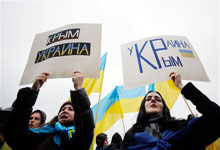 Ukraine president Oleksander Turchynov refuses to bow to 'Kremlin scenario' in Crimea
Ukraine president Oleksander Turchynov refuses to bow to 'Kremlin scenario' in Crimea
Ukraine refuses to follow "a scenario written by the Kremlin" but will not intervene militarily in Crimea, acting president Oleksander Turchynov has told the AFP news agency, as his country sank deeper into crisis.
With the strategic Black Sea peninsula threatening to secede from Ukraine, Turchynov said Kiev would not launch a military operation in the southeastern region, where Russian-backed forces have seized de facto control, because it would risk exposing its eastern border.
The president, who came to power last month after violent protests brought down the previous pro-Moscow government, also condemned an forthcoming referendum in Crimea as a "sham", the results of which will be fixed in Moscow.
"We cannot launch a military operation in Crimea, as we would expose the eastern border (close to Russia) and Ukraine would not be protected," Turchynov said as the worst East-West crisis since the Cold War continued to escalate.
"Significant tank units are massed near Ukraine's eastern border," he added, referring to Russian forces.
"They're provoking us to have a pretext to intervene on the Ukrainian mainland ... (but) we cannot follow the scenario written by the Kremlin."
The tensions have led to mass protests in parts of southern and eastern Ukraine – mostly Russian-speaking regions – with protesters storming the regional government buildings in the cities of Donetsk and Lugansk.
While he shied away from going on the offensive in Crimea, Turchynov insisted Ukraine would "not be inactive in the face of continued aggression".
"They (Russia) can attack our military units in Crimea, spread their aggression on the continent. The army will react," he vowed.
Crimea is due to hold a referendum Sunday on joining Russia, and on Tuesday, the pro-Moscow authorities in the autonomous Black Sea peninsula took the additional step of voting for full independence from Ukraine.
Turchynov however dismissed Sunday's secession vote, saying: "It's a sham, most of the people of Crimea will boycott this provocation.
"What they call the referendum will not happen in Crimea but in the offices of the Kremlin," he said.
"The Russian forces don't intend to hold a referendum, they're just going to falsify the results," he added, saying "no civilised country will recognise these results."
The referendum is being organised by Crimea's self-appointed leaders, who are not recognised by the new pro-European government in Kiev, installed following three months of protests that resulted in 100 deaths and the ouster of pro-Moscow President Viktor Yanukovych.
Conversely, Turchynov is not recognised by Moscow, which still sees Yanukovych as Ukraine's legitimate president.
World powers have repeatedly called for Moscow and Kiev to come together to seek a solution to the escalating crisis in Crimea, but Turchynov said Russia's leaders were refusing any dialogue with their Ukrainian counterparts.
"Unfortunately, for now Russia is rejecting a diplomatic solution to the conflict," he told AFP.
"They are refusing all contact at foreign ministry and top government level," he added, as Western powers, led by the US and Germany, continued to push for the creation of a contact group to avert full-fledged war.
With interim Prime Minister Arseniy Yatsenyuk due to meet US President Barack Obama in Washington on Wednesday, Turchynov said Kiev was counting on Western help "to stop Russian aggression".
Russia, which guaranteed Ukraine's safety in a 1994 deal along with Britain and the United States in return for Kiev giving up its nuclear weapons, now "is acting like an aggressor instead of fulfilling its duty", Turchynov said.
"The US and the European Union must force Russia to stop this military aggression and these provocations against Ukraine," he added.
He also rubbished claims that Russian-speakers in Ukraine faced discrimination as "madness". Russian President Vladimir Putin had justified Moscow's incursion into Crimea with the need to protect "Russian-speaking populations", who make up the majority there.
Turchynov, who was speaking to AFP after a meeting of the national security and defence council in Kiev, will have a brief mandate, with snap presidential elections scheduled on May 25 in which he does not plan to stand.
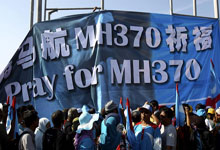 Search widened as Malaysia air probe finds scant evidence of attack
Search widened as Malaysia air probe finds scant evidence of attack
nvestigators in Malaysia are voicing skepticism that the airliner that disappeared early Saturday with 239 people on board was the target of an attack, US and European government sources close to the probe said.
The fate of the Malaysian airliner that vanished about an hour into a flight to Beijing remained a mystery, as a massive air and sea search, now in its third day, failed to turn up any trace of the Boeing 777 plane.
Neither Malaysia's Special Branch, the agency leading the investigation locally, nor spy agencies in the United States and Europe have ruled out the possibility that militants may have been involved in downing Malaysia Airlines Flight MH370.
But Malaysian authorities have indicated that the evidence so far does not strongly back an attack as a cause for the aircraft's disappearance, and that mechanical or pilot problems could have led to the apparent crash, the US sources said.
"There is no evidence to suggest an act of terror," said a European security source, who added that there was also "no explanation what's happened to it or where it is."
Nuclear test experts to check if plane exploded
Meanwhile, dozens of ships and aircraft from 10 countries were still scouring the seas around Malaysia and south of Vietnam as questions mounted over possible security lapses that could have led to a downing of the Boeing 777-200ER after it climbed to an altitude of 35,000 feet (10,670 meters).
Interpol confirmed on Sunday at least two passengers used stolen passports and said it was checking whether others aboard had used false identity documents.
Even so, one U.S. source said Malaysian authorities were leaning away from the theory that the plane was attacked. Their view was mostly based on electronic evidence that indicates the flight may have turned back toward the Malaysian capital of Kuala Lumpur before disappearing.
Even that information has not been clearly confirmed, and investigators and intelligence sources say the fate of the Flight MH370 is still shrouded in mystery.
One reason was that the aircraft had failed to make automatic contact with a flight data-monitoring system after vanishing from radar screens, two people familiar with the matter said on Monday. Such contact could have helped investigators determine what happened.
The aircraft was equipped with a maintenance computer capable of talking to the ground automatically through short messages known as ACARS. "There were no signals from ACARS from the time the aircraft disappeared," a source involved in the investigations said.
Also raising doubts about the possibility of an attack, the United States extensively reviewed imagery taken by spy satellites for evidence of a mid-air explosion, but saw none, a U.S. government source said. The source described US satellite coverage of the region as thorough.
With no success so far, authorities were planning to widen the search from Tuesday, Azharuddin Abdul Rahman, the head of Malaysia's Civil Aviation Authority, told reporters on Monday.
"Unfortunately we have not found anything that appears to be objects from the aircraft, let alone the aircraft," he said. "As far as we are concerned, we have to find the aircraft. We have to find a piece of the aircraft if possible."
Azharuddin said a hijacking attempt could not be ruled out as investigators explore all theories.
A senior police official told Reuters that people armed with explosives and carrying false identity papers had tried to fly out of Kuala Lumpur in the past, and that current investigations were focused on two passengers who were on the missing plane with stolen passports.
"We have stopped men with false or stolen passports and carrying explosives, who have tried to get past KLIA (airport) security and get on to a plane," he said. "There have been two or three incidents, but I will not divulge the details."
Azharuddin also said the two men with stolen passports did not look like Asians, but he did not elaborate. Airport CCTV footage showed they completed all security procedures, he said.
"We are looking at the possibility of a stolen passport syndicate," he said.
About two-thirds of the 227 passengers and 12 crew now presumed to have died aboard the plane were Chinese. The airline said other nationalities included 38 Malaysians, seven Indonesians, six Australians, five Indians, four French and three Americans.
In pictures: The mystery of the missing jet
A senior source involved in preliminary investigations in Malaysia said the failure to find any debris indicated the plane may have broken up mid-flight, which could disperse wreckage over a very wide area.
"The fact that we are unable to find any debris so far appears to indicate that the aircraft is likely to have disintegrated at around 35,000 feet," said the source.
Asked about the possibility of an explosion, the source said there was no evidence of foul play and that the aircraft could have broken up due to mechanical causes.
Still, the source said the closest parallels were the bomb explosions on board an Air India jetliner in 1985 when it was over the Atlantic Ocean and a Pan Am aircraft over the Scottish town of Lockerbie in 1988. Both planes were cruising at around 31,000 feet at the time.
Underlining the lack of hard information about the Malaysian plane's fate, a U.S. Navy P-3 aircraft capable of covering 1,500 square miles (3,900 square km) every hour was sweeping the northern part of the Strait of Malacca, on the other side of the Malaysian peninsula from where the last contact with MH370 was made.
No distress signal was sent from the lost plane, which experts said suggested a sudden catastrophic failure or explosion, but Malaysia's air force chief said radar tracking showed it may have turned back from its scheduled route before it disappeared.
Superior safety record
The Boeing 777 has one of the best safety records of any commercial aircraft in service. Its only previous fatal crash came on July 6 last year when Asiana Airlines Flight 214 struck a seawall on landing in San Francisco, killing three people.
Timeline: Malaysia Airlines flight MH370 to Beijing missing from the radar
US planemaker Boeing declined to comment.
The passenger manifest issued by the airline included the names of two Europeans who were not on the plane. Their passports had been stolen in Thailand during the past two years.
An Interpol spokeswoman said a check of all documents used to board the plane had revealed more "suspect passports", which were being investigated.
"Whilst it is too soon to speculate about any connection between these stolen passports and the missing plane, it is clearly of great concern that any passenger was able to board an international flight using a stolen passport listed in Interpol's databases," Interpol Secretary General Ronald Noble said.
A Thai travel agent who arranged the tickets for the two passengers using the stolen passports said she had booked them on the flight via Beijing because they were the cheapest tickets, the Financial Times reported.
The travel agent in the resort of Pattaya said an Iranian business contact she knew only as "Mr. Ali" had asked her to book tickets for the two men on March 1.
She had initially booked them on other airlines but those reservations expired and on March 6, Mr. Ali had asked her to book them again. She told the newspaper she did not think Mr. Ali, who paid her in cash and booked tickets with her regularly, was linked to terrorism.
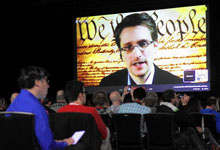 Edward Snowden warns of personal data vulnerability
Edward Snowden warns of personal data vulnerability
AUSTIN, Texas — Edward Snowden brought no bombshells when he arrived to an excited round of applause Monday, his stubbled face relaxed as it was beamed in from across the continents for a "virtual conversation" about the vulnerability of personal data. His presence was event enough.
Public appearances by the former National Security Agency contractor and U.S. exile are rare, and this one was beamed in from an undisclosed location in Russia via several online proxies for his own security, a bit of technological cloak-and-dagger that could only add to his mystique for the three roomfuls of international tech specialists struggling to hear his words in video that was choppy and often inaudible.
His message still got through: Personal information is vulnerable not only to government prying but to growing numbers of outside infiltrators because companies have failed to adequately protect the data of their customers. His own exile after leaking to reporters secret information he had gathered while an NSA consultant has made him a central figure in that conversation, and he says he has no regrets.
"Would I do it again? Absolutely," Snowden said into the camera, in response to one of several questions submitted to him via Twitter (#AskSnowden) and screened backstage at the South by Southwest Interactive conference. "I took an oath to support and defend the Constitution. And I saw the Constitution was being violated on a massive scale."
He warned, "If we allow the NSA to continue unrestrained, every other government will accept that as a green light to do the same."
The chosen Twitter questions were notably nonconfrontational for a figure often the subject of heated debate even among supporters. One asked whether the mass surveillance was driven by privatization. Another wondered about the potential for society to "reap benefits" from the "big data." None asked about his life in Russia, or what further revelations might be coming.
The first question came from Timothy John Berners-Lee, a British scientist known as the inventor of the World Wide Web, who asked Snowden how he would create an accountability system for governance.
"We have an oversight model that could work. The problem is when the overseers are not interested in oversight," Snowden said. "The key factor is accountability."
Onstage in Austin, lawyer Ben Wizner and ACLU principal technologist Chris Soghoian conversed with Snowden as he appeared on a big screen, an image of the U.S. Constitution superimposed behind him. The three agreed that an easier means for citizens to encrypt their data was a pressing need.
"Most regular people are not going to download an obscure encryption app," Soghoian said. He also noted that "without Ed's disclosures, a lot of tech companies would not have improved cybersecurity."
Snowden said, "We need to think of encryption not as a dark art," and warned that the NSA was "setting fire to the future of the Internet. And the people in this room, you guys, are the firefighters."
For his audience, Snowden's choice of the SXSW conference to directly address his peers in data technology was easy to understand.
"You have people from every major media company, every major brand, every major agency," Ryan Kite, a director of digital strategy for Los Angeles-based marketing agency TVGla, said after Snowden's hourlong talk. "Where else would you get a message like that out there to people who actually move and control the data?
"He was insightful," Kite added. "He made me think about privacy versus functionality. He was a good predictor about what's happening. We have a choice — which path do we go down? Do we go down that path of free and easy with no liberty and complete openness to all of our data? Or do we switch and take preventative measures and secure everything?"
While not as excited a crowd as that gathered this week to hear Lena Dunham's keynote speech at the SXSW Film conference — that line was much longer — Snowden's audience was a nearly full house of 3,000. Tech registrants steadily entered the hall to hushed electronic music. In front of the stage, an artist drew a running comic on the issues being discussed.
Hans Meier, a teacher of interactive design at Oslo School of Architecture and Design in Norway, said Snowden seemed "like a sympathetic person. Maybe not as a leader. What he's done is such a breakthrough thing, and he's got so many enemies, so for him there will always be this buzz whenever he comes on. But he's broken ground for a lot of other people to speak out. He's made these companies actually tighten up the security."
Snowden has kept a low profile of late — he faces felony charges of espionage and theft of government property — and has said he won't return until the United States changes its whistle-blower protection laws.
Atty. Gen. Eric H. Holder Jr. has taken a strong stand against granting amnesty to Snowden, saying he caused harm to national security and should be held accountable. Holder has described him as a defendant, not a whistle-blower.
Barton Gellman, a Washington Post reporter who has worked with Snowden, released a video of his own ahead of Snowden's appearance. He said Snowden wanted to speak with "the people who are building and creating the next generation of the Internet" because "technologists" are "a group he wants to influence."
"He's looking for places where there can be reform" to "practices that he regards as overbroad and overly intrusive," Gellman said.
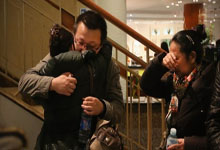 Vietnam probes possible debris from missing Malaysia plane
Vietnam probes possible debris from missing Malaysia plane
Vietnamese navy planes have spotted what could be fragments from the missing Malaysia Airlines jet that disappeared almost two days ago.
Officials said it was too dark to be certain the objects were from Flight MH370, which had 239 people on board.
A multinational team is searching for wreckage and ships will try to confirm the find after dawn.
Investigators are also checking CCTV footage of two passengers who were travelling on stolen passports.
Malaysian military officials said on Sunday that the plane may have turned back from its scheduled route shortly before vanishing from radar screens, further deepening the mystery surrounding its fate.
Relatives of the missing passengers have been told to prepare for the worst.
Contact lost
Flight MH730 left Kuala Lumpur, bound for Beijing, at 00:41 local time on Saturday (16:41 GMT on Friday). But radio contact was lost at 17:30 GMT, somewhere between Malaysia and Vietnam.
Late on Sunday, the Vietnamese authorities said possible debris from the plane had been spotted in the sea off south Vietnam.
"We received information from a Vietnamese plane saying that they found two broken objects, which seem like those of an aircraft, located about 50 miles to the south-west of Tho Chu Island," an unnamed official from the National Committee for Search and Rescue told AFP news agency.
"As it is night they cannot fish them out for proper identification. They have located the position of the areas and flown back to the land," he added.
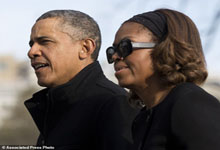 Obama meet with Ukraine prime minister wednesday
Obama meet with Ukraine prime minister wednesday
President Barack Obama will meet this week with Ukrainian Prime Minister Arseniy Yatsenyuk at the White House in a prominent show of U.S. support for Ukraine's fledgling new government.
Vice President Joe Biden cut short his trip to Latin America, nixing a planned stop in the Dominican Republic so he can attend Wednesday's meeting, an aide to Biden said.
Biden had been the White House's prime point of contact with Ukraine's president, Viktor Yanukovich, before he fled to Russia last month following violent clashes in Kiev.
Obama's White House meeting with Yatsenyuk will focus on options to peacefully resolve Russia's military intervention in the Ukrainian region of Crimea, the White House said, adding that the resolution must respect Ukraine's sovereignty and territorial integrity.
By inviting Yatsenyuk, whose government Russian President Vladimir Putin alleged took power by way of an unconstitutional coup, the U.S. is also sending a clear signal to Moscow that the U.S. considers Yatsenyuk to be Ukraine's legitimate leader — at least for the time being.
'What we've seen is the president mobilizing the international community in support of Ukraine to isolate Russia for its actions in Ukraine, and to reassure our allies and partners,' said Tony Blinken, Obama's deputy national security adviser, as he announced the meeting Sunday on NBC's Meet the Press.
The announcement came as the Kremlin was beefing up its military presence in Crimea ahead of a planned March 16 referendum on whether Crimea should break way from Ukraine and join Russia.
Putin defended the separatist drive as in keeping with international law, but Yatsenyuk vowed not to relinquish 'a single centimeter' of his country's territory.
Obama has warned that the vote would violate international law.
Biden, who was traveling Sunday to Chile to attend the swearing-in of the country's new president, had been expected to travel later in the week to the Dominican Republican to meet with President Danilo Medina.
But Biden has canceled that stop and will return to Washington on Tuesday, in time for Obama's meeting with Yatsenyuk on Wednesday, the vice president's office said.
The White House said Biden planned to reschedule his trip to the Dominican Republic.
Vacationing with his family over the weekend in Key Largo, Fla., Obama on Saturday spoke individually with British Prime Minister David Cameron, Italian Prime Minister Matteo Renzi and French President Francois Hollande, and collectively with the presidents of Lithuania, Latvia and Estonia.
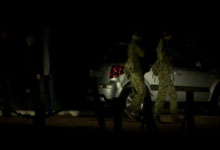 Ukraine crisis: Russia warns US against 'hasty' sanctions
Ukraine crisis: Russia warns US against 'hasty' sanctions
Russia's Foreign Minister Sergei Lavrov has warned the US not to take "hasty and reckless steps" in response to the crisis in Ukraine's Crimea region.
In a phone call with his US counterpart John Kerry, Mr Lavrov said imposing sanctions on Moscow would harm the US.
Pro-Russian troops have been in control of Crimea for the last week.
Earlier, a stand-off involving pro-Russian soldiers at a Ukrainian military base outside Sevastopol reportedly ended without incident.
Crimea's parliament announced on Thursday it would hold a referendum on 16 March on whether to join Russia or remain part of Ukraine.
Russia's parliament has promised to support Crimea if it chooses to become part of Russia.
The vote has been denounced as "illegitimate" by the interim government in Kiev, which took power after President Viktor Yanukovych fled to Russia last month in the wake of mass protests against his government and deadly clashes with security forces.
In their telephone conversation on Friday, Mr Lavrov warned Mr Kerry against taking "hasty and unthought-through steps capable of causing harm to Russian-US relations", Russia's foreign ministry reports.
Mr Lavrov said imposing sanctions on Russia in response to its involvement in Ukraine "will inevitably have a boomerang effect against the US itself".
The US State Department said Mr Kerry had "underscored the importance of finding a constructive way to resolve the situation diplomatically, which would address the interests of the people of Ukraine, Russia and the international community".
"Secretary Kerry and Foreign Minister Lavrov agreed to continue to consult in the days ahead on the way forward," said the US statement.
Members of pro-Russian armed units stand in front of the local parliament in the Crimean capital of Simferopol 7 March 2014.
Pro-Russian troops have been blockading key installations in Crimea for a number of days
People, including a woman waving Crimean flags, attend an outdoor performance of Russian Crimean folk music on 7 March 2014 in Simferopol, Ukraine
The majority Russian-speaking Crimea region is of political and strategic significance to both Russia and Ukraine
On Friday evening, the Interfax-Ukraine news agency cited Ukraine's defence ministry as saying a lorry had rammed open the gates of the missile defence base A2355 outside the Crimean city of Sevastopol and that about 20 "attackers" had entered, throwing stun grenades.
The Ukrainian troops barricaded themselves inside a building and their commander began negotiations before any shots were fired, it added.
The BBC's Christian Fraser, who visited the scene, said the gates did not appear to have been driven through, and there was no sign that the base had been seized.
There were two military lorries with Russian number plates outside the gates, surrounded by irregular soldiers and a very hostile crowd of pro-Russian demonstrators, our correspondent adds.
Two journalists who attempted to take photographs were beaten badly.
Later, a Ukrainian officer told a Daily Telegraph journalist that the stand-off had ended after the "talks", and that the Russian lorries and about 30 to 60 Russians troops had withdrawn. No shots are believed to have been fired.
 International Women's Day marked with Google Doodle
International Women's Day marked with Google Doodle
Celebration: The doodle created to mark International Women's Day
Google has created a doodle to celebrate International Women's Day.
The American internet giant has devised one of its iconic moving illustrations to mark the event, which has been observed since the early 1900s.
The doodle features 27 female chromosomes and a video of women from around the world including education rights campaigner Malala Yousafzai and British charity worker Camila Batmanghelidjh.
The President of Lithuania, Dalia Grybauskait, also makes an appearance.
The video is accompanied with a soundtrack from the Belgian-Congolese vocal group Zap Mama.
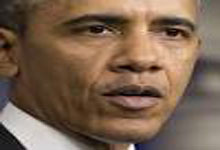 UPDATE 6-Obama warns on Crimea, orders sanctions over Russian moves in Ukraine
UPDATE 6-Obama warns on Crimea, orders sanctions over Russian moves in Ukraine
(Reuters) - President Barack Obama on Thursday ordered sanctions on people responsible for Moscow's military intervention in Ukraine's Crimea Peninsula, including travel bans and freezing of their U.S. assets, and said a referendum by the region to join Russia would violate international law.
U.S. officials said a list of people targeted by the sanctions had not yet been drawn up but that Russian President Vladimir Putin was not going to be one of them. White House spokesman Jay Carney said he was not aware of a limit on the number of people listed.
Obama spoke to Putin for an hour on Thursday and said the situation could be solved diplomatically in a way that addressed the interests of Russia, Ukraine and the international community, the White House said.
It said Obama spoke later with Japan Prime Minister Shinzo Abe and the two men agreed Russia's actions were a "threat to international peace and security."
Separately, the U.S. House of Representatives overwhelmingly passed a bill backing loan guarantees for the new government in Kiev. The U.S. Senate is expected to consider a similar bill backing $1 billion in loan guarantees next week.
Obama signed an executive order aimed at punishing those Russians and Ukrainians responsible for the Russian military incursion into Crimea, which has triggered the worst crisis in U.S.-Russian relations since the end of the Cold War.
Escalating the crisis, Crimea's parliament on Thursday voted to join Russia and its Moscow-backed government set a referendum on the decision in 10 days.
Obama, appearing in the White House press room hours after signing the order, said the U.S. sanctions were meant to impose costs on Russia for its actions. He said the international community was acting together and warned that a referendum in Crimea would violate international law as well as the Ukrainian constitution.
"Any discussion about the future of Ukraine must include the legitimate government of Ukraine," Obama said. "In 2014, we are well beyond the days when borders can be redrawn over the heads of democratic leaders."
Obama and administration officials emphasized that the U.S. sanctions could be adjusted or additional steps taken as Russian behavior changed.
"While we take these steps, I want to be clear that there is also a way to resolve this crisis that respects the interests of the Russian Federation, as well as the Ukrainian people," the president said, calling for international monitors to be allowed into Ukraine as well as direct talks between Moscow and Kiev.
"Russia would maintain its (military) basing rights in Crimea, provided that it abides by its agreements and respects Ukraine's sovereignty and territorial integrity. And the world should support the people of Ukraine as they move to elections in May," he said, calling that the "path to de-escalation."
Obama made the same argument in his call with Putin.
"President Obama emphasized that Russia's actions are in violation of Ukraine's sovereignty and territorial integrity, which has led us to take several steps in response, in coordination with our European partners," the White House said in a description of the call.
FLEXIBLE TOOL, ROOM FOR DIALOGUE
The White House called the order a "flexible tool" aimed at those directly involved in destabilizing Ukraine, noting that additional steps could be taken if necessary. Any Russian actions in eastern Ukraine would be a potential reason for further measures, a senior U.S. official said.
The State Department is also putting visa bans in place on a number of officials and individuals responsible for, or complicit in, threatening the sovereignty and territorial integrity of Ukraine.
But Putin is not one of those to be singled out, a senior administration official said.
"It is an unusual and extraordinary circumstance to sanction a head of state, and we would not begin our designations by doing so," the official said.
The Crimean Peninsula in the Black Sea has an ethnic Russian majority and is home to a Russian naval base in Sevastopol.
Obama is attempting to rally global opinion against the Russian move, which Putin says was aimed at protecting ethnic Russians in Crimea. The intervention followed the ouster of Ukraine's pro-Russian president last month.
Several hundred chanting demonstrators, many waving blue-and-yellow Ukrainian flags, gathered outside the White House on Thursday to protest Russia's intervention in Crimea.
They carried signs that read: "Putin Sucks," and "Putin is a war criminal," and chanted: "Russia, hands off Ukraine!" and in Ukrainian: "Glory to Ukraine, glory to the heroes of Ukraine!"
The United States wants Russian troops to return to their bases in Crimea and for Moscow to allow international monitors into the region to ensure the human rights of ethnic Russians there are protected.
Obama's order was announced as U.S. Secretary of State John Kerry began a meeting with Russian Foreign Minister Sergei Lavrov in Rome. Kerry noted that the sanctions were designed to allow talks to go forward.
"We want to be able to continue the intense discussions with both sides in order to try to normalize and end this crisis," he said. "We will absolutely consider if we have to take additional steps beyond what we've done, but our preference ... is to emphasize the possibilities for the dialogue that can lead to the normalization and defusing of this crisis."
The Obama order targets any assets held in the United States by "individuals and entities" responsible for the Russian military intervention in Ukraine, threatening its territorial integrity or seeking to assert governmental authority over any part of Ukraine without authorization from the government in Kiev.
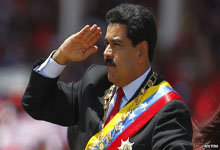 Venezuela expels Panama ambassador over 'conspiracy'
Venezuela expels Panama ambassador over 'conspiracy'
Venezuela has expelled Panama's ambassador and three other diplomats amid growing tensions over opposition protests.
The officials were given 48 hours to leave the country.
It comes a day after Venezuelan President Nicolas Maduro broke diplomatic relations and froze economic ties with Panama.
At least 20 people have died in anti-government protests in Venezuela in the last month.
Mr Maduro has accused Panama of conspiring to bring down his government.
The latest fallout comes after the Central American nation requested a meeting at the Organization of American States (OAS) to discuss Venezuela's crisis.
"There are moves by the United States government in accord with a lackey government of a right-wing president which has been creating the conditions for the OAS and other bodies to step towards an intervention in our country," Mr Maduro said earlier this week.
Barricades
Four diplomats working at Panama's embassy, including ambassador Pedro Pereira, were declared "persona non grata" on Thursday, according to Panama's Deputy Foreign Minister Mayra Arosemena.
Venezuelan Foreign Minister Elias Jaua said Venezuela also had suspended debt negotiations over $1bn (£600,000) owed to Panamanian exporters, according to reports.
Meanwhile a member of Venezuela's National Guard and a motorcyclist became the latest victims of the unrest in the country on Thursday.
The pair were shot dead during clashes that broke out when a group of men of motorcycles tried to clear opposition barricades in a street in Caracas.
Anti-government protesters run from tear gas during clashes with police at Altamira square in Caracas 6 March 2014.
The unrest has continued in the Venezuelan capital, Caracas
The opposition accuses the government of using armed civilian groups on motorcycles to break up demonstrations.
Thousands of government supporters and troops took part in a huge parade through the centre of the capital, commemorating the first anniversary of former President Hugo Chavez's death on 5 March.
In other parts of the city, anti-government protesters kept up their barricades, despite an appeal made by opposition leaders to "respect" the anniversary.
Venezuelans have long been complaining about high levels of crime, record inflation and shortages of some staple items.
But in the last three weeks marches initially started by disgruntled students in the western states of Tachira and Merida spread to other areas and gained support.
Panama said it was "astonished" by Venezuela's decision to break diplomatic relations and called Mr Maduro's words "unacceptable".
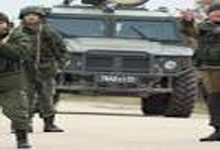 Ukraine crisis: US and Russia to hold key talks
Ukraine crisis: US and Russia to hold key talks
US Secretary of State John Kerry and Russian Foreign Minister Sergei Lavrov are due to hold crucial talks to try to ease tensions over the Ukraine crisis.
The US accuses Moscow of deploying troops in Ukraine's Crimea region, describing it as an "act of aggression" - a claim denied by the Kremlin.
Despite the sharp differences, both sides have hinted they would prefer to start a dialogue.
Moscow remains in de facto control of Ukraine's southern autonomous region.
The tense stand-off continued overnight in Crimea, but there were no reports of any violence.
Earlier this week tensions escalated further over Russia's warnings that it could also move into eastern Ukraine to protect Russians and Russian-speakers there.
The move has triggered wide condemnation across the globe.
In other developments:
Nato and Russia will hold talks in Brussels. Nato chief Anders Fogh Rasmussen earlier said Russia continued to "violate Ukraine's sovereignty and territorial integrity"
EU foreign policy chief Catherine Ashton will travel to Kiev for talks with the new government
Russia said it successfully tested an intercontinental ballistic missile on Tuesday
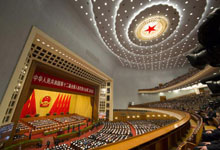 China targets 7.5% GDP growth for 2014
China targets 7.5% GDP growth for 2014
China on Tuesday targeted a modest 7.5 per cent GDP growth in 2014, unchanged from last year, as the government looks to steer the economy onto a more sustainable and balanced path.
The new target was announced in the first work report by Premier Li Keqiang at the annual session of the National People’s Congress.
Comprising about 3000 deputies, the NPC began its eight-day session in the backdrop of last Saturday’s horrific knife attacks by a group of militants from Xinjiang at Kunming railway station in which 33 people were killed and 143 injured in what the official media called as China’s 9/11.
The NPC session began by silent tribute to the victims of the Kunming attack.
Presenting his first work report after completing one year in the office, Mr. Li set this year’s economic growth target at 7.5 per cent, the same as last year’s target and slightly lower than the 7.7 per cent actual growth in 2013.
Other key economic goals, such as consumer price index and unemployment rate, remain generally the same as those of last year.
Mr. Li said the reform will focus on the most wanted areas, the most pressing problems and the sections having the biggest consensus.
China faces great challenges and complex problems in pushing forward economic and social development, he said.
“The foundation for sustaining steady economic growth is not yet firm, and the internal impetus driving growth needs to be increased,” Mr. Li said.
The world economic recovery still faces instability and uncertainties, as macro-policy adjustments made by some countries introduce new variables and emerging economies are facing new difficulties and challenges, he said.
Domestically, Mr. Li cited risks from public finance and banking; overcapacity, difficulties in exercising macro-controls and increasing agricultural output and rural incomes, as major challenges.
Deep-seated problems are surfacing while painful adjustments need to be made, he said.
“The pace of economic growth is changing and downward pressure on the economy remains great,” he said.
China, however, is able to maintain a moderate and even high economic growth for some time to come as industrialisation and urbanisation are continuing and there is considerable potential for regional development, he said.
Tasks of tackling air, water and soil pollution, as well as conserving energy and reducing emissions remain arduous, Mr. Li said adding that there were major structural problems constraining employment, Mr. Li said.
Other problems include public dissatisfaction in housing, food and drug safety, medical services, old-age services, education, income distribution, land expropriation and resettlement, public order, frequent industrial accidents and the social credibility system, Mr. Li said.
Some government employees are prone to corruption and some still do not perform their duties with integrity and diligence, he said.
Mr. Li said China will speed up the development of mixed-ownership economy by letting non-state capital into more state projects, including those in oil, railways and telecoms.
“We will formulate measures for non-state capital to participate in investment projects of central government enterprises,” he said.
Non-state capital will be allowed to participate in a number of projects in areas such as banking, oil, electricity, railway, telecommunications, resources development and public utilities, he said, according to the report.
The government pledged to reform the railway investment and financing system, and to open competitive operations in more areas to encourage full participation of private capital.
The government also announced some reform moves targeted at the country’s state-owned enterprises.
“We will improve the system for managing state-owned assets, clearly define the functions of different SOEs, and carry out trials of investing state capital in corporate operations,” Mr. Li said.
A reform master plan released after a key plenum of the Communist Party of China in 2012 pledged to let market play a decisive role and recognised the private sector’s role in fostering growth and creating jobs.
The document said China shall actively develop a mixed ownership economy, allowing more SOEs and other firms to develop into mixed-ownership companies.
China’s top oil refiner Sinopec announced in mid-February that it would bring in social and private capital to jointly market and sell its oil products, the first opening up of the largely monopolised sector.
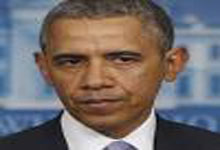 Putin Might Face G-8 Boycott as Obama Warns on Ukraine
Putin Might Face G-8 Boycott as Obama Warns on Ukraine
President Barack Obama warned that Russia would face “costs” if it intervenes in Ukraine, and an American official said the U.S. was consulting with European allies on boycotting a planned G-8 meeting in Russia in June.
“We are now deeply concerned about reports of military movements taken by the Russian Federation inside of Ukraine,” Obama said at the White House yesterday. “The United States will stand with the international community in affirming there will be costs” for violating Ukraine’s sovereignty.
The U.S. and allies may find it difficult to attend the Group of Eight meeting in Sochi, Russia, in June if Russia violates its commitments to a sovereign Ukraine, according to an Obama administration official who asked for anonymity to describe the discussions. Russia’s desire for improved trade and commercial ties may also be put at risk, the official said.
Obama decided to speak publicly after U.S. intelligence confirmed that a number of Russian troops had entered Ukraine in vehicles, transport planes and helicopters without the permission of the country’s new interim government, said two U.S. officials briefed on the matter. Both requested anonymity to discuss classified reports.
The officials said the Russian forces’ mission, at least initially, appeared to be securing airfields near the region’s capital of Simferopol and reinforcing a small contingent of Russian marines stationed at the home base of the Russian Black Sea fleet in Sevastopol.
Escalate Crisis
While they declined to discuss the nature, number or weaponry of the Russian forces, the officials said two concerns are that the airfields might be used to bring additional Russian forces into Crimea and that resistance from Ukrainian forces or civilian protesters could cause the crisis to escalate.
The president, who spoke to Russian President Vladimir Putin for more than an hour last week, didn’t confirm in his White House appearance statements by Ukrainian officials who accused Russia of invading the southern Crimea region, where unidentified gunmen seized airports, government buildings and other facilities.
“Right now the situation remains very fluid,” Obama said, adding that Vice President Joe Biden spoke yesterday with the new Ukrainian prime minister, Arseniy Yatsenyuk.
Ukraine’s ambassador to the United Nations, Yuriy Sergeyev, said in New York that Russia illegally flew military transport aircraft and helicopters across Ukrainian borders.
No Questions
Obama didn’t say what the U.S. might do if Russia moved its military into Ukraine, and he took no questions after making his statement.
Russia’s ambassador to the UN, Vitaly Churkin, speaking yesterday in New York, said he had no information on his country’s military presence in Crimea.
Senator Rand Paul, a Kentucky Republican, said Russia committed, along with the U.S. and the U.K., to honor Ukraine’s sovereignty under the 1994 Budapest Memorandum.
“Russia, which has begun to experience the benefits of expanded trade with World Trade Organization accession, should think long and hard about honoring their treaty obligations and fostering the stability that creates prosperity for its citizens,” he said.
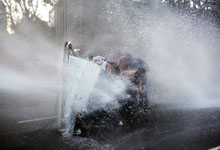 Anti-government protests continue in Venezuela
Anti-government protests continue in Venezuela
Scattered barricades blocked streets in some Caracas neighbourhoods on Friday even while life went on as usual in others as a political standoff persisted through the second day of national holidays.
In spite of the long weekend heading into three days of Carnaval, student-led demonstrations have so far maintained a street presence, not just in the capital, but also in cities including Valencia, Merida and San Cristobal.
In that context President Nicolas Maduro forged ahead with a new round of televised peace meetings on Friday. He announced his intention to establish similar conferences in all states. Absent were members of the opposition, who refuse to open a dialogue until Mr. Maduro releases protesters from jail and stops harsh crackdowns on protests.
“I believe the country would win if we see each other face to face and talk,” Mr. Maduro said. He also announced that national guardsman Giovanny Jose Hernandez Pantoja died on Friday after being shot in the eye while he and others removed debris from a street in Valencia.
But that appears unlikely to happen with one opposition leader in jail and an arrest order out for another.
About two weeks of student-led protests mostly in middle-class neighbourhoods have left 18 dead. Venezuelans face inflation that hit 56 per cent last year, scarcity of basic necessities and runaway violent crime.
At a human rights demonstration in a well-off part of east Caracas, several hundred protesters waved Venezuelan flags and held signs with the photos of those killed during demonstrations. “There’s not going to be peace until there’s justice,” said 32-year-old hairdresser Amanda Valero.
But in the massive slum of Petare life marched on normally with hundreds of street vendors pushing their wares at its central circle.
“The people of Petare are warriors, the people of Petare don’t stop for anything,” said Yuly Chacon, a 27-year-old teacher. “Those (protests) are the things of the wealthy areas.”
Mildri Villegas, a 29-year-old homemaker there, said the protests were a waste of time. “If you don’t work, you don’t eat. You have to work to survive.”
Venezuela’s chief prosecutor Luisa Ortega Dtaz announced on Friday the shooting death of a youth who was cleaning a street in Carabobo state one day earlier.
The United Nations human rights chief called on Friday for the Venezuelan government to respect peaceful assemblies and expressed concern about the use of excessive force against protesters. And U.S. Secretary of State John Kerry said Washington would consider its options in light of a Senate proposal to deny and revoke visas and freeze assets of Venezuelans linked to government repression.
Venezuelan authorities say they have arrested eight members of the domestic spy agency on murder charges, as well as three national guard soldiers and three police officers.
“The Venezuelan state has acted to punish, to sanction those persons who appear responsible for human rights violations,” Ortega Diaz, the chief prosecutor said.
 Ukraine crisis: Vladimir Putin's silence adds to the confusion
Ukraine crisis: Vladimir Putin's silence adds to the confusion
MOSCOW: Despite repeated vows not to interfere or intervene, President Vladimir V. Putin's Russia has now found itself more deeply ensnared than ever in Ukraine's worsening political crisis, facing appeals to support the country's ethnic Russians, provide haven for its deposed president and perhaps even undertake a military response. The question is whether he intended it that way.
Putin himself has made no public remarks on the turmoil in Ukraine since President Viktor F. Yanukovych's flight from Kiev six days ago. That coincided with the end of the Winter Olympics in Sochi, which officials here have celebrated as proof of the emergence of a new, powerful and proud Russia nearly a quarter-century after the collapse of the Soviet Union.
Putin's silence has resulted in confusion over Russia's policy, even as the crisis in Ukraine has moved closer to Russia's own border and raised concerns about Ukraine's geopolitical and economic effect on Russia, which could stand to lose what it considers a place that is not only within its sphere of influence but part of its political and social identity.
For now, Putin's strategy for retaining Russia's influence in a country where the Kremlin has profound interests - from its largest foreign military base to gas pipelines that fuel its economy - remains unknown and full of risks. Even so, events are subtly forcing Moscow's hand.
Yanukovych's appeal for Russia "to secure my personal safety" - and reports that he will hold a news conference in the southern Russian city of Rostov-on-Don on Friday have made it clear that the Kremlin has quietly provided at least tacit assistance to a humiliated leader who has been abandoned even by his own political supporters.
The seizure of the regional Parliament building in Crimea by masked gunmen vowing loyalty to Russia, and not Ukraine, has renewed fears that Putin could be provoked into a military intervention like the one in 2008 when Russian troops poured into Georgia to defend a breakaway region, South Ossetia, that it now recognizes as an independent country.
Russian officials have dismissed such fears as absurd, but at the same time, Putin ordered a surprise military exercise involving 150,000 troops on Ukraine's doorstep that was clearly intended as a palpable warning about Russia's preparedness. It prompted warnings in return from NATO and the United States that Russia should do nothing provocative and respect Ukraine's territorial integrity.
Putin has a number of options to influence affairs in Ukraine short of an armed intervention. Ukraine's economy is entwined with that of Russia, which is by far its greatest trading partner, and Ukraine's heavy industry is hugely dependent on Russian gas. And the Kremlin can inflame separatist tensions almost at will, if it so desires, destabilizing the country.
Perhaps Putin's most effective weapon though is time, sitting back and watching as the West takes ownership of an economy on the brink of collapse.
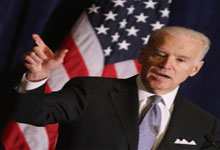 US Vice President Joe Biden calls Ukraine PM Arseny Yatseniuk, pledges support
US Vice President Joe Biden calls Ukraine PM Arseny Yatseniuk, pledges support
US Vice President Joe Biden on Thursday welcomed the formation of a new government in Ukraine in a phone call with Ukrainian Prime Minister Arseny Yatseniuk and pledged US support for reforms, the White House said.
"The vice president reassured the prime minister that the United States will offer its full support as Ukraine undertakes the reforms necessary to return to economic health, pursue reconciliation, uphold its international obligations, and seek open and constructive relationships with all its neighbors," the White House said.
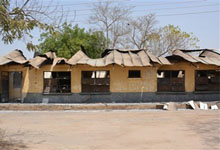 Nigeria midnight school massacre: Boko Haram kill 43 students, abduct 16 girls
Nigeria midnight school massacre: Boko Haram kill 43 students, abduct 16 girls
Lagos: The militant outfit Boko Haram staged yet another brutal show of terror when dozens of them attacked a boarding school in Nigeria's Yobe state after midnight, shooting and burning to death at least 43 students, who were asleep in their dormitories, unmindful of the onslaught.
Besides killing 43 students, they also abducted 16 girls, reports from Nigeria said.
The school targeted by the militants - the Federal Government college of Buni Yadi – is a secondary boarding school located near Damaturu, the capital of Yobe state.
The militants numbering 50, went on an unabated killing spree, shooting at students and burning classrooms and dormitories, and also not sparing the government and private establishment, reducing them to ashes.
The militants suffered no resistance as there were no security officials to combat them.
According to the local Nigerian media reports, the attack took place within 24 hours of withdrawing the soldiers manning the check point close to the school.
Just hours before the attack, the “soldiers stationed close to the school were redeployed without any cogent reason,” a Nigerian news website the Vanguard quoted the Yobe State's Governor’s media aide, Alhaji Abdullahi Bego as saying.
The Governor of the Yobe state, Ibrahim Gaidam himself regretted the lack of security men near the school at the time of the attack.
"It is unfortunate that up to five hours when this massacre took place, there were no security agents around to stop or contain the situation," he said in a statement, according to the BBC.
Expressing his regret at the massacre, President Goodluck Jonathan paid condolences to the families of the murdered students and condemned the "heinous, brutal and mindless killing of the guiltless students by deranged terrorists and fanatics who have clearly lost all human morality and descended to bestiality".
Meanwhile, the Nigerian military in a statement assured the citizens that they will pursue the attackers and do their best to ensure their safety.
Similar attacks have been staged by the Boko Haram earlir and this is the fourth ssuch attack in last months.
Last year in September, the militant outfit had targeted the College of Agriculture in Gujba town in a similar midnight raid, killing 40 students while they were asleep.
Boko Haram, which means western education is sin, is an extremist group that plans to establish a strict Sharia establishment in the country.
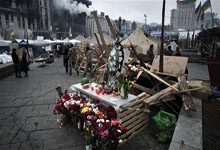 US and Britain say Ukraine is not a battleground between East and West
US and Britain say Ukraine is not a battleground between East and West
The United States and Britain have said Ukraine should not be a battleground between East and West and voiced support for the country after protests that ousted pro-Moscow president Viktor Yanukovych.
World powers are seeking to ease tensions over Ukraine as the interim authorities in Kiev grapple with the threat of economic collapse and separatism.
William Hague, the foreign secretary, after talks with his American counterpart John Kerry, backed Ukraine's territorial integrity, with fears the nation - which has strong links to Russia - could be torn apart.
"This is not a zero-sum game, it is not a West versus East," said Mr Kerry after the two men met at the State Department.
"This is about the people of Ukraine and Ukrainians making their choice about their future."
Mr Hague, who is planning to visit Kiev shortly, was equally emphatic, saying: "This is a country that needs financial assistance from many sources, including from Russia.
"It's not about pulling them away from Russia. It's about enabling them to make their own choices."
Ukraine will have to be "able to meet the conditions for that and it is important for economic reforms to take place," he said.
A "pervasive culture of corruption" must also be tackled for the international community to feel that it can support Ukraine.
"It is obviously not in the interests of Russia for Ukraine to face economic collapse," Mr Hague added. "It isn't in the interests of Russia for the world to turn away."
And Mr Hague urged Ukraine's interim leaders "to form an inclusive government, involve people from different parts of Ukraine including from the east and the south of Ukraine. It's important for Ukrainians to be able to make these decisions together after the terrible divisions of recent months."
"We want to send our strong support for the territorial integrity and unity of Ukraine," he added.
Mr Kerry said Washington also wanted to work with Moscow "and with everybody available, to make sure that this is peaceful from this day forward," after almost 100 people died in days of unrest that culminated in the toppling of Mr Yanukovych, a Russian ally.
Mr Kerry's former US Senate colleagues, after a classified briefing by a senior State Department official, also expressed concerns about Ukraine's territorial pressures.
"We have to be very strong about our views as to keeping the territorial integrity together," Senator Robert Menendez, chairman of the Senate Foreign Relations Committee, told reporters after the briefing.
Mr Menendez also said MPs could begin looking at "potential sanctions" as a way to ensure a stable transition to a new government.
Several MPs emerged from the briefing stressing that Washington needed to keep a watchful eye on Russian President Vladimir Putin's intentions regarding Ukraine.
"I'm always mindful that Russia, that Mr. Putin, has his own priorities and that could be inconsistent" with Ukraine's decision-making, which "needs to be independent of outside influence," Senator Ben Cardin told reporters.
Senator John McCain, who has openly expressed suspicion of Putin for years, warned that the Russian leader has long had his eye on Ukraine as the "crown jewel" of the former Soviet states.
"I know that Putin believes that Ukraine is part of Russia. He is committed to that," Mr McCain said.
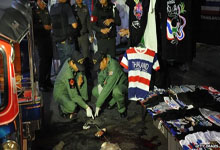 New Italy PM wins confidence vote, vows ‘radical change’
New Italy PM wins confidence vote, vows ‘radical change’
ROME: Prime Minister Matteo Renzi called for a "radical and immediate change" in recession-hit Italy as he outlined his new government´s reform agenda before winning a crucial confidence vote in the Senate early Tuesday.
In an energetic and impassioned speech to parliament, Italy´s youngest-ever premier reiterated plans for rapidly overhauling the tax system, jobs market and public administration in a bid to tackle the country´s ailing economy.
"If we lose this challenge the fault will be mine alone. No-one has an alibi anymore," the 39-year-old said as his fiery speech prompted jeers and insults from opposition benches.
"This is an Italy of possibilities, an Italy of fundamental change," he said, stressing the "urgency" of implementing reforms in "a rusty country... gripped by anxiety".
Renzi, who grasped power after helping oust his predecessor Enrico Letta over failures to do enough to boost a flagging economy, later won the vote of confidence, with 169 votes in favour and 139 against, according to Senate speaker Pietro Grasso.
In his speech, he pledged to review unemployment benefits, establish a guarantee fund for small companies and comprehensively reform the justice system.
He also promised to cut the tax burden by a double-digit figure within months and pay off public administration debts.
The initial reaction from investors appeared positive, with Milan´s FTSE stock market closing up 0.48 percent after Renzi´s speech.
But small business association Confartigianato wondered where the prime minister hoped to find the money for the reforms, with its head Giorgio Merletti saying "a couple of quick sums show that there is 100 billion euros ($137 billion) to find immediately".
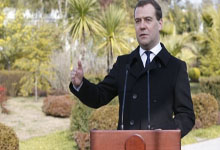 Ukraine crisis: Russia steps up Ukraine rhetoric Ukraine crisis: Russia steps up Ukraine rhetoric
Russia has stepped up its rhetoric against Ukraine's new Western-leaning leadership as tensions rise over the ousting of President Viktor Yanukovych.
Russian PM Dmitry Medvedev said interim authorities in Kiev had conducted an "armed mutiny".
And the Russian foreign ministry said dissenters in mainly Russian-speaking regions faced suppression.
Earlier, Ukraine's interim interior minister said an arrest warrant had been issued for Mr Yanukovych.
MPs voted to remove Mr Yanukovych on Saturday. His whereabouts are unknown but he was reported to have been in the Crimean peninsula on Sunday.
Russia has already recalled its ambassador to Ukraine for consultation.
Unrest in Ukraine began in November when Mr Yanukovych rejected a landmark association and trade deal with the EU in favour of closer ties with Russia.
Mr Medvedev, quoted by Russian news agencies, suggested that Western countries that accepted Ukraine's new authorities were mistaken.
"The legitimacy of a whole number of organs of power that function there raises great doubts," he said.
"Some of our foreign, Western partners think otherwise. This is some kind of aberration of perception when people call legitimate what is essentially the result of an armed mutiny."
He added: "We do not understand what is going on there. There is a real threat to our interests and to the lives of our citizens."
Ukraine's foreign ministry quickly responded to Mr Medvedev's comments on Russian citizens in Ukraine, saying his concerns were "unfounded".
However, Russia's foreign ministry also issued a strongly worded statement saying a "forced change of power" was taking place in Ukraine and accused interim leaders of passing new laws "aimed at infringing the humanitarian rights of Russians and other ethnic minorities".
Activists are still manning barricades in Kiev
Tensions between pro- and anti-Russian demonstrators are high in Sevastopol, Crimea
"A course has been set towards suppressing dissenters in various regions of Ukraine by dictatorial, and sometimes even terrorist, means," a statement said.
 Thailand crisis: Bangkok blast toll rises to three
Thailand crisis: Bangkok blast toll rises to three
A young girl has died from injuries sustained in Sunday's bomb blast in Bangkok, bringing the death toll from the attack to three.
The apparent grenade blast took place near an anti-government protest site in the heart of the capital.
A woman, 59, and a four-year-old boy were confirmed dead on Sunday. Doctors said on Monday that the little boy's sister died later of brain injuries.
Twenty-two people were hurt, including a nine-year-old boy in intensive care.
Sunday's attack came hours after gunmen opened fire on an anti-government rally in eastern Thailand, killing a five-year-old girl.
Thai Prime Minister Yingluck Shinawatra has condemned the attacks, describing them as "terrorist acts for political gain".
UN Secretary Ban Ki-moon has also spoken out, calling for violence "from any quarter" to end immediately.
Tensions across Thailand have escalated since a wave of anti-government protests began in November.
The demonstrators want Ms Yingluck to resign to make way for an appointed interim government, but she has refused.
Last week, several people were killed in clashes that erupted in Bangkok when police began clearing sites blocked by protesters.
No group has so far said they carried out either of the weekend attacks.
But the BBC's Jonathan Head in Bangkok says it appears to be the start of retaliation by the armed wing of the so-called "red-shirt" movement that backs the governing Pheu Thai party.
Ms Yingluck heads a government that won elections in 2011 with broad support from rural areas.
In response to the protests, the prime minister called snap elections on 2 February, which her government was widely expected to win.
However, the polls were boycotted by the opposition and voting was disrupted by protesters at about 10% of polling stations, meaning by-elections are needed before a government can be formed.
Correspondents say red-shirt activists have watched with growing frustration as the protesters - who enjoy the backing of the military and powerful royalists - have been allowed to obstruct the government and sabotage the election.
On Sunday, leaders of the pro-government United Front for Democracy against Dictatorship (UDD) held a rally attended by thousands of supporters.
"This fight will be harder than any other ... You must think how we can deal with [protest leader] Suthep [Thaugsuban] and those supporting him," UDD leader and Pheu Thai official Jatuporn Prompan said.
 Thailand crisis: Bangkok blast toll rises to three
Thailand crisis: Bangkok blast toll rises to three
A young girl has died from injuries sustained in Sunday's bomb blast in Bangkok, bringing the death toll from the attack to three.
The apparent grenade blast took place near an anti-government protest site in the heart of the capital.
A woman, 59, and a four-year-old boy were confirmed dead on Sunday. Doctors said on Monday that the little boy's sister died later of brain injuries.
Twenty-two people were hurt, including a nine-year-old boy in intensive care.
Sunday's attack came hours after gunmen opened fire on an anti-government rally in eastern Thailand, killing a five-year-old girl.
Thai Prime Minister Yingluck Shinawatra has condemned the attacks, describing them as "terrorist acts for political gain".
UN Secretary Ban Ki-moon has also spoken out, calling for violence "from any quarter" to end immediately.
Tensions across Thailand have escalated since a wave of anti-government protests began in November.
The demonstrators want Ms Yingluck to resign to make way for an appointed interim government, but she has refused.
Last week, several people were killed in clashes that erupted in Bangkok when police began clearing sites blocked by protesters.
No group has so far said they carried out either of the weekend attacks.
But the BBC's Jonathan Head in Bangkok says it appears to be the start of retaliation by the armed wing of the so-called "red-shirt" movement that backs the governing Pheu Thai party.
Ms Yingluck heads a government that won elections in 2011 with broad support from rural areas.
In response to the protests, the prime minister called snap elections on 2 February, which her government was widely expected to win.
However, the polls were boycotted by the opposition and voting was disrupted by protesters at about 10% of polling stations, meaning by-elections are needed before a government can be formed.
Correspondents say red-shirt activists have watched with growing frustration as the protesters - who enjoy the backing of the military and powerful royalists - have been allowed to obstruct the government and sabotage the election.
On Sunday, leaders of the pro-government United Front for Democracy against Dictatorship (UDD) held a rally attended by thousands of supporters.
"This fight will be harder than any other ... You must think how we can deal with [protest leader] Suthep [Thaugsuban] and those supporting him," UDD leader and Pheu Thai official Jatuporn Prompan said.
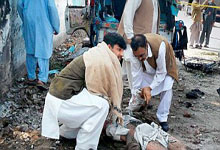 Over 50 killed on bloody day in Afghanistan and Pakistan
Over 50 killed on bloody day in Afghanistan and Pakistan
t was a bloody day in Af-Pak region with Taliban insurgents killing soldiers in Afghanistan, Pakistani army pounding militants as important talks were being called off across the border, and a blast killing a score of civilians in Pakistan.
Hundreds of heavily armed Taliban insurgents killed 21 soldiers and captured seven others in a pre-dawn attack at army checkpoints in eastern Afghanistan on Sunday, officials said, making it the deadliest single incident for the Afghan army in at least a year.
The Talibans have escalated attacks in recent months as it tries to take advantage of the withdrawal of foreign troops at the end of 2014.
Afghanistan's Taliban also said it has suspended mediation with the US to exchange a captive US soldier for five senior Taliban prisoners held in US custody in Guantanamo Bay.
Across the border, Pakistani military carried out fresh air strikes early morning in Tirah Valley in Khyber Agency in the country's northwest tribal areas on the Afghan border, killing at least 20 terrorists and injuring many others, as peace talks with the Taliban remained suspended.
An improvised explosive devices making factory and huge quantities of explosives were destroyed in strikes, a military source said. The attacks came a day after the air strikes in Hangu district of Khyber Pakhtunkhwa in which nine terrorists were killed.
The decade-long insurgency has claimed around 40,000 lives
The military has gone on an offensive and has carried out air strikes in North Waziristan and Khyber Agency killing over 40 suspected terrorist in the last one week. The air strikes were carried out following a joint decision taken by the military and civilian leadership.
The government has been trying to engage the banned Tehrik-e-Taliban Pakistan and others in peace talks to end the decade-long insurgency that has claimed about 40,000 lives.
Government negotiators have set a ceasefire as a precondition for another round of talks but spokesperson for the TTP Shahidullah Shahid has blamed Islamabad for the deadlock and asked the state to declare a ceasefire first.
Hours after the military air strikes, at least 12 people, including a child, were killed and 14 others injured in a bomb blast in northwest Pakistan's Kohat city. Inspector General of Khyber Pakhtunkhwa police, Nasir Khan Durrani, said the blast appeared to have been carried out using a planted explosive device.
Durrani said that according to initial reports, five kilograms of explosives were used in the blast which were planted in a wooden crate placed on the roadside.
 North Korea: Famine drives people to eat their own children
North Korea: Famine drives people to eat their own children
New Delhi: Plagued by the policies of his obnoxious rulers, North Korea is in dire straits. Cut-off from the rest of the world, partly because of their government and partly due to the sanctions imposed on the country, the country is under severe stress.
People in North Korea are digging graves and killing their own children to escape the famine. A shockingly large numbers of cannibalistic incidents have been reported from the province of Hwanghae after a hidden famine gripped the nation.
Recently, a starving man in North Korea has been executed after murdering his two children for food.
Undercover reporters from Asia Press told Sunday Times that a man dug up the corpse of his child to escape hunger. While another boiled his child for food.
The nation’s leader, Kim Jung Un has spread large sum of money on two rocket launchers as the nation and its people battle with the 'worst famine on the planet'.
One informer was quoted as saying that a a man was executed by the firing squad after he killed his two children and tried to eat them.
The informant said the father killed his eldest daughter while his wife was away on business and then killed his son because he had witnessed the murder, according to news report published in Daily Mail.
The man told his returning wife that they had meat, but his wife got suspicious and informed the police.
According to the reports, food was confiscated from the people of Hwanghae province and given to the residents of the capital, Pyongyang.
The Sunday Times also quoted an official of the ruling Korean Worker's party as saying: 'In a village in Chongdan county, a man who went mad with hunger boiled his own child, ate his flesh and was arrested.
Several other incidents of cannibalism have come to light. In May, a man was one man was executed after eating part of a colleague and then trying to sell the remains as mutton, Quote Daily Mail.
One man killed and ate a girl and a third report of cannibalism was recorded from 2011.
Another man was executed in May after murdering 11 people and selling the bodies as pork.
Famines are quite common in the North Korean nation. In 1990s a a famine known as the Arduous March - killed between 240,000 and 3.5million people.
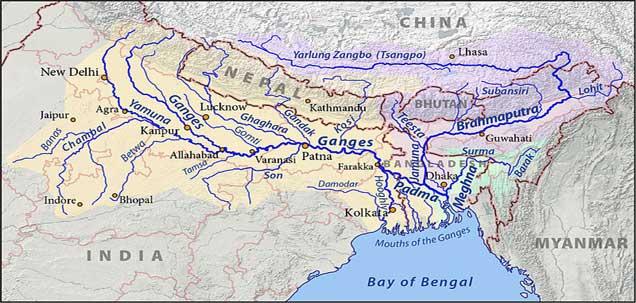 China provokes india again, restarts construction of dams on Brahmaputra
China provokes india again, restarts construction of dams on Brahmaputra
China has approved construction of three more projects on the Brahmaputra River. The decision came after a two year lull in construction activities on the Brahmaputra River.
The dams are supposed to be complete by 2015, according to a news report published in a leading daily.
Construction on one of the three dams has already begun. The dam is being constructed on the middle reaches of the river, known in China as Yarlung Zangbo. The dam is expected to assist in power generation through 510 MW hydropower project in Zangmu in Tibet Autonomous Region (TAR).
Work on other two power projects is expected to begin shortly. One is a 640 MW dam and will be constructed 18 km upstream of Zangmu. The third power project is comparatively low yield, 320 MW dam being built at Jieux, 11km upstream of Zangmu.
The construction of dam will affect the availability of water in the Indian Territory. The construction of the dam will affect the water to India, a charge denied by the Chinese government.
According to Chinese scientists, the Brahmaputra River originates from Angsi Glacier, located on the northern side of the Himalayas in Burang County of Tibet. The river is 3,848 km long and its drainage area is 712,035 square km, says a study conducted last year.
From Tibet, it flows to India and from there on to Bangladesh. India and China have an agreement to exchange data on water flows of Brahmaputra River.
 Obama 'optimistic' on fiscal cliff deal
Obama 'optimistic' on fiscal cliff deal
WASHINGTON: US President Barack Obama, pushing for a deal to avoid the looming tax hikes and spending cuts known as the "fiscal cliff," entered last-minute talks with Senate leaders, saying he still believed an agreement could be reached before the Jan. 1 deadline.
After Obama and the leaders of Congress held an hour-long, high-stakes meeting Friday afternoon to try to avoid the severe, automatic austerity measures that threaten to send the economy sputtering into another recession, the president called the gathering "good and constructive."
"I'm optimistic we may still be able to reach an agreement that can pass both houses in time," Obama declared in a brief press conference. Obama referred to "dysfunction in Washington," and said the American public is "not going to have any patience for a politically self-inflicted wound to our economy. Not right now."
Surprisingly, after weeks of postelection gridlock, Senate leaders sounded even more bullish.
The Republican Leader, Sen. Mitch McConnell, said he was "hopeful and optimistic" of a deal, adding he hoped a compromise could be presented to rank-and-file lawmakers as early as Sunday, a little more than 24 hours before the year-end deadline.
Said Majority Leader Harry Reid: "I'm going to do everything I can" to prevent the tax increases and spending cuts that threaten to send the economy into recession. He cautioned, "Whatever we come up with is going to be imperfect."
Officials said there was a general understanding that any agreement would block scheduled income tax increases for middle class earners while letting rates rise at upper income levels.
The US faces the fiscal cliff because tax rate cuts dating back to President George W. Bush's tenure expire at the end of the year. The pending across-the-board reductions in government spending, which will slice money out of everything from social programs to the military, were put in place last year as an incentive to both parties to find ways to cut spending. That solution grew out of the two parties' inability in 2011 to agree to a grand bargain that would have taken a big bite out of the deficit.
Facing a deadline that was born out of Washington's dysfunction, success was far from guaranteed - even on a slimmed-down deal that postponed hard decisions about spending cuts into 2013 - in a Congress where lawmakers grumbled about spending the new year holiday in the Capitol.
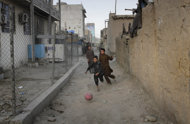 NATO helicopter crashes in Afghanistan
NATO helicopter crashes in Afghanistan
KABUL, Afghanistan (AP) — A NATO helicopter crashed Thursday in eastern Afghanistan but no one was hurt, the U.S.-led coalition said.
The crew was recovered after the crash, which occurred in Parwan province. NATO said the cause of the incident was under investigation.
The Taliban claimed its fighters shot down the aircraft, but the coalition said that initial reports indicated no militant activity in the area.
Also in the east, villagers protested the deaths of civilians in a coalition airstrike earlier this week in Khost province.
The civilians were killed Tuesday during a fight between insurgents and an Afghan-led security force, which was searching for a leader of the Haqqani network, a militant group affiliated with the Taliban and al-Qaida.
A coalition helicopter was called to support ground troops, who were being hit with rocket-propelled grenades and small arms fire. The coalition said the helicopter killed several of the insurgents and unintentionally, some members of the insurgents' families who were living with the fighters.
Gen. Raz Mohammad Oryakhail, an Afghan army commander in Khost, said 13 people — including the Haqqani leader, six of his fighters and members of their families — were killed in the strike in Shamul district.
Nepal plane crash kills all 19 on board
All 19 people, including seven Britons and five Chinese, aboard a small plane carrying trekkers to the Everest region, were killed today when the aircraft crashed and burned after a bird hit as soon as it took off from the Nepalese capital. Sixteen passengers and three crew members who were heading towards Lukla, gateway to Mt Everest, for trekking in the mountain region, were all killed when a Sita Airways-owned Dornier aircraft crashed two minutes after it took off at 6:15 am (local time) from the Tribhuvan International Airport, officials said.
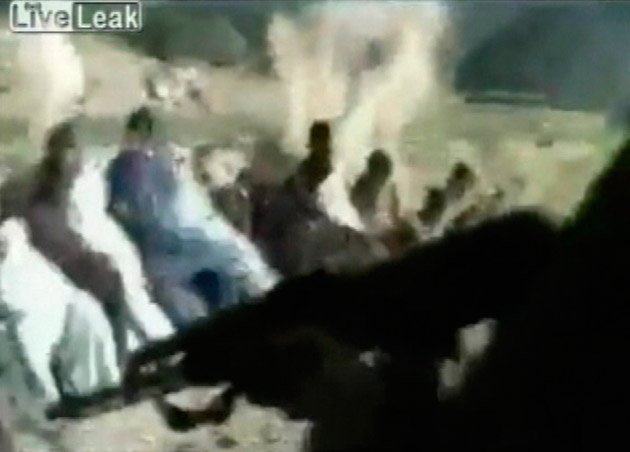 Taliban execute Pakistani policemen on video
Taliban execute Pakistani policemen on video
The Taliban released a video Monday showing fighters executing 16 Pakistani tribal policemen in a hail of gunfire after they were captured in a cross-border raid from Afghanistan in June.
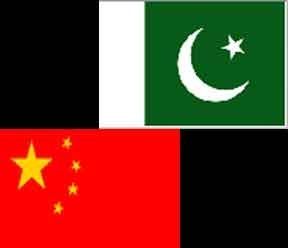 Pakistan constructing missile boats with China's help
Pakistan constructing missile boats with China's help
Islamabad: Pakistan has begun to construct missile boats with China's cooperation, an official said.
The missile boats would be armed with anti-surface missiles, automatic guns and weapons systems, reported Geo News.
Defence Production Secretary Lt. General Shahid Iqbal, who attended the keel laying ceremony for the construction of the missile boat, said it would help build up the defence capability of the Pakistan Navy.
The missile boats are being built with China's cooperation in the Karachi Shipyard.
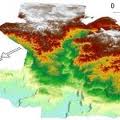 The Lost World: Geologists discover ancient landscape beneath the Atlantic Ocean
The Lost World: Geologists discover ancient landscape beneath the Atlantic Ocean
Washington: Geologists have discovered what they say is an ancient, lost landscape that lies deep beneath the sediment of the North Atlantic Ocean near the northern coast of Scotland.
The massive landscape with furrows cut by rivers and peaks that once belonged to mountains is believed to be some 56 million years old. "It looks like a map of a bit of a country onshore. It is like an ancient fossil landscape preserved 2km beneath the seabed," senior study researcher Nicky White said.
The researchers, who used an advanced echo-sounding technique to find the landscape, said their data has so far revealed a landscape about 10,000 square km west of the Orkney-Shetland Islands that stretched above sea level by almost as much as 1km.
They suspect it is part of a larger region that merged with what is now Scotland and may have extended toward Norway in a hot, prehuman world.
The researchers, who detailed their findings in the journal Nature Geoscience, used high pressured air via metal cylinders, producing sound waves that travel to the ocean floor and beneath it, through layers of sediment. Every time the sound waves encountered a change in the material, an echo bounced back and microphones trailing behind the ship on cables record these echoes.
From the information, they constructed 3D images of the sedimentary rock below, said White, a geologist at the University of Cambridge in Britain.
The team found a wrinkly layer 2km beneath the seafloor - evidence of the buried landscape , reminiscent of the mythical , lost Greek island Atlantis.
They traced eight major rivers, and core samples, taken from the rock beneath the ocean floor, revealed pollen and coal, evidence of land-dwelling life.
But above and below these deposits, they found evidence of a marine environment, including fossils, indicating the land rose above the sea and then subsided - "like a terrestrial sandwich with marine bread," White said.
Now, the burning question, according to White, is what made this landscape rise up, then subside? He has a theory pointing to an upwelling of material through the Earth's mantle beneath the North Atlantic Ocean called the Icelandic Plume. The plume works like a pipe carrying hot magma from deep within the Earth to right below the surface. The researchers believe a giant hot ripple pushed the landscape above the North Atlantic, then as the ripple passed, the land fell back beneath the ocean
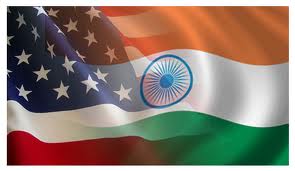 Human bombs may attack direct flights to US from India, other nations
Human bombs may attack direct flights to US from India, other nations
Washington: The United States has alerted international carriers, including those from India, flying directly into its territory, that terrorist groups might surgically implant bomb into human beings to carry out attacks.
"This is new intelligence about a possible technique that could be used, however there is nothing to indicate an imminent threat," a senior US security official told PTI on condition of anonymity as he is not authorised to discuss intelligence information with the media.
The heightened communications and activities by the US, it is learnt, are in response to a potential threat, but there is no specific information about an imminent threat coming from a particular area.
"Such a threat is likely to come from overseas rather than domestically, but precautionary steps are being taken internationally and in the US," the official said.
It is understood that all countries including India with airports that have last-point-of-departure flights to the US have been alerted with the latest intelligence input gathered by the United States; which continues to be the prime target of the terrorists across the world, especially those based in Pakistan and Afghanistan.
Since the Indira Gandhi International Airport in New Delhi and the Chatrapati Shivaji International Airport have flights having last-point-of-departure to the US, it is logical that tightened security might be experienced by passengers at these two Indian airports as a result of the latest terror alert.
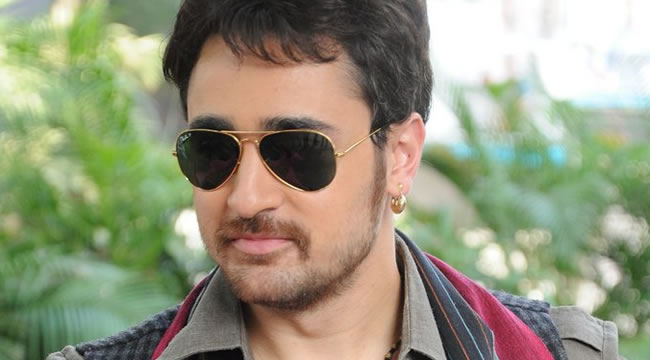 I wasn't romantically involved with Benazir Bhutto, says Imran Khan
I wasn't romantically involved with Benazir Bhutto, says Imran Khan
Islamabad: A new biography of Pakistani cricketer-turned-politician Imran Khan pooh-poohs suggestions that he was romantically involved with slain former premier Benazir Bhutto.
"One of my cousins was interested in her (Bhutto) and she also took an interest when I introduced them to each other. At one point, marriage was virtually on the cards," Khan told Frank Huzur, his Indian biographer.
Khan, who now heads the Pakistan Tehrik-e-Insaaf party, described Bhutto as a "personal friend" and said there was "mutual admiration between them".
According to Khan, Bhutto had an affair with the "spotlight".
"She trusted my instincts for counsel. Politics was not her calling, but she was able to make it her calling. She would have made a great ambassador for Pakistan," Khan is quoted as saying in an excerpt from Huzur's book "Imran Vs Imran".
"Talking glibly came easy to her. Retorting is not everyone's forte. Benazir had the ability to retort with thunderous impact followed by one of her crystal-eyed stares. She wanted to stay in charge for ever," Khan said.
Nearly two years ago, author Christopher Sandford claimed in his biography of Khan that Bhutto became infatuated with Khan during their student days at Oxford University in the 1970s and the pair enjoyed a "close" and possibly a "sexual" relationship.
Sandford also claimed Khan's mother unsuccessfully tried to organise an arranged marriage between the pair.
In "Imran Vs Imran", Khan further said: "When Benazir was sworn in as the first Muslim (woman) prime minister, I thought I had lost a friend to the murky game of power politics. I enjoyed her confidence."
He added, "...While among friends, she would brag about her father's political skills. A number of us would chuckle over her confident brag, but she would put up a sparkling show.
"In Oxford debates, she would roar over the issues of human rights abuse, rule of law, gender justice, discrimination and fiscal corruption. But when she found herself in the middle of the power pitch, she metamorphosed into a venal, self-centred political empress. She tasted the blood of power, and got drunk."
Bhutto was killed by a suicide bomber shortly after she had addressed an election rally in the garrison city of Rawalpindi in December 2007.
 India's foreign secretary, Nirupama Rao, moved by Pakistan’s change of heart on terrrorism
India's foreign secretary, Nirupama Rao, moved by Pakistan’s change of heart on terrrorism
New Delhi: Last month’s foreign secretary-level dialogue with Pakistan seems to have given India a genuine ray of hope.
In a significant statement, foreign secretary Nirupama Rao has said that the “prism” through which Pakistan sees terrorism “has definitely been altered”.
When asked during a TV channel interview whether there has been a change in Pakistan’s attitude, Rao said: “I think the prism through which they see this issue (terrorism) has definitely been altered… I see that as an outcome that we must take note of, that we must take cognisance of.”
Terming Pakistan’s change of attitude as a “concrete development”, Rao said Pakistan discussed terrorism and fake currency as well.
“I think when they speak of the fact that non-state elements in this relationship need to be tackled, we must look at safe havens and sanctuaries, that we must look at fake currency, we must look at all the aspects that are concerned with the business of terror, I think that is a concrete development.”
However, she also laid stress on the fact that India should not be expecting dramatic breakthroughs in just one or two round of talks, and that the process would take time.
On David Headley’s confessions linking ISI and Pakistan army to terrorism, and the subsequent denials by Pakistan’s interior minister Rehman Malik, Rao said: “…we should not read literal outcomes into all this. The fact is that we are engaging each other, India and Pakistan, on all issues including the 26/11 trial. And when I met my counterpart Salman Bashir in Islamabad a few days ago, these are the very issues that I raised with him.”
She also “completely refuted allegations” that India has “given away the store” by discussing Kashmir.
On the NSG issue, Rao said she had “confirmation” from the United States, France and Russia “that they stand by the commitments (on civil nuclear trade with India)” and that there is no dilution of these commitments.
Though confident that the international nuclear order “will change in India’s favour”, the foreign secretary said NSG’s decision was not the end of the road and that “there are leverages that we can exert from our side also”.
She said India needs to study NSG guidelines which have not been made public.
 India, China giving US stiff competition on jobs: Obama
India, China giving US stiff competition on jobs: Obama
Washington: Citing stiff competition from nation's like China, India and Brazil, President Barack Obama has said he is not prepared to bring US deficit down by sacrificing education, medical research or rebuilding of infrastructure.
"We live in a world where America is facing stiff competition for good jobs from rapidly growing nations, like China and India and Brazil," he said at two Democratic Party fundraisers in Philadelphia on Thursday lamenting the lack of progress on some of the nation's problems.
"For a long time we were told the best way to win that competition is just to undermine consumer protections and undermine clean air laws and clean water laws and hand out tax breaks to millionaires and billionaires," Obama said.
"That was the idea that held sway for close to a decade. And let's face it, it didn't work out very well," he said accusing opposition Republicans seeking their party's presidential nomination for the 2012 election for already being more interested in political attacks than solving America's problems.
"They won't have a plan, they'll attack," Obama said. "The American people are a lot less interested in us attacking each other. They're more interested in us attacking the country's problems."
In current negotiations over the budget deficit, Obama said Republicans are advocating policies that would turn back the progress made during his administration. "This is not just a numbers debate, this is a values debate," he said. "We can make changes that are balanced." "
"Like families all across America, government has to live within its means. So I'm prepared to bring our deficit down by trillions of dollars," Obama said.
But "I'm not going to reduce our deficit by eliminating medical research being done by our scientists. I won't sacrifice rebuilding our roads and our bridges and our railways and our airports," he said.
 Shoot at sight orders in Karachi as violence toll mounts
Shoot at sight orders in Karachi as violence toll mounts
Islamabad: Shoot at sight orders have been issued in the port city of Karachi where spiralling violence over the past three days has left 63 people dead, media reports said on Friday.
The third consecutive day of violence in Karachi on Thursday saw 34 people being killed in armed attacks on buses and houses.
The toll in three days of violence now stands at 63.
Saud Mirza, a senior police official, said that 18 people were killed in armed attacks in Qasba Colony and parts of Orangi Town.
Twelve people were killed and over 30 injured in attacks on two passenger buses, reported a news agency.
The Sindh government has given shoot at sight orders to security personnel to normalise the city's deteriorating situation.
It also decided that those who forcefully close down shops and businesses would be arrested, reported a news daily.
Interior Minister Rehman Malik, who has arrived in Karachi, told reporters: "...Definitely there will be targeted actions in the affected areas and I have ordered deployment of 1,000 FC troops to enforce law in the city."
He called upon Muttahida Qaumi Movement (MQM) chief Altaf Hussain and the Awami National Party to play their role to restore peace in the city.
"Karachi is in a sensitive situation, but we have all the information, we know where the planning was done to start violence, we know who are the elements behind it and we are determined to take action against them," he was quoted as saying.
Media report said that the bus attacks on Friday targeting mainly Urdu-speaking passengers appeared to be in retaliation of the killing of five Pakhtuns whose bodies were found in a minibus on Thursday.
 Strauss-Kahn sexual assault case: Maid could be deported from US
Strauss-Kahn sexual assault case: Maid could be deported from US
The Guinean maid, who accused former IMF chief Dominique Strauss-Kahn of sexual assault, may face perjury charges and she can also be deported from the US following claims that she lied under oath, a news report said.
The 32-year-old hotel maid is under intense scrutiny after New York prosecutors told a court on Friday that they had found holes in her story which may seriously damage her credibility as a witness, 'Daily Telegraph' online reported.
Moreover, local media reports also alleged that the maid at Sofitel Hotel was doing double duty as a prostitute, collecting cash on the side from male guests, and that Strauss-Kahn may have misunderstood the situation on May 14.
Strauss-Kahn, 62, was accused of forcing the maid at the Sofitel hotel in Manhattan to perform oral sex. He was bundled out of a Paris-bound flight and taken into custody. He claims their sexual encounter was consensual.
But the case against him is hanging by a thread with reports claiming that soon after the incident, she's recorded telling a drug dealer in Arizona: "Don't worry, this guy has a lot of money. I know what I'm doing."
But what is certain is that the maid told detectives and prosecutors that afterwards "she fled to an area of the main hallway" and "waited there until she observed the defendant leave suite 2806".
A letter filed to court by Cyrus Vance jr, the Manhattan district attorney, said: "The complainant testified to this version of events when questioned in the Grand Jury about her actions."
However, she "has since admitted that this account was false" and that she went on to clean another room, and returned to clean Strauss-Kahn's suite, before reporting the incident to her supervisor, the newspaper said.
Vance's letter also stated that the maid had admitted in interviews that information she gave on her 2004 application for asylum in the US -- including that she had been gang raped -- "was false".
She "certified under penalty of perjury" that the application was true.
Under New York state law, testifying falsely in a way that is material to the case being considered is perjury in the first degree, a class D felony punishable with up to seven years in prison.
Arrivals to the US may also be deported if convicted of "fraudulently obtaining immigration benefits" through false statements.
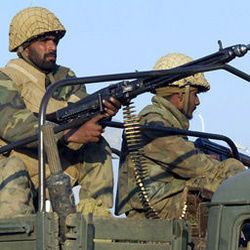 Pak military still supporting terror outfits: Militant commander
Pak military still supporting terror outfits: Militant commander
NEW YORK: Notwithstanding its repeated refutal of links with terror groups, the Pakistan military continues to support a broad range of militants as part of its three-decade strategy of using proxies against its neighbours and US forces in Afghanistan, a former top militant commander has claimed.
Terror groups like Lashkar-e-Taiba, Harkat-ul-Mujahedeen and Hizbul Mujahedeen are run by religious leaders, with the Pakistani military providing training, strategic planning and protection, the militant leader said.
A former top militant commander, said he was supported by the Pakistani military for 15 years as a fighter, leader and trainer of insurgents until he quit a few years ago.
The commander is well known in militant circles, but accustomed to a covert existence, New York Times reported publishing an interview, the paper claimed he gave on the condition that his name, location and personal details would not be revealed.
Times said, that the former commander's account belies years of assurance by Pakistan to American officials since September 11 2001 attacks that it has ceased supporting militant groups on its territory.
The militant commander said that Pakistan's military and intelligence establishments had not abandoned its policy of supporting militant groups as tools in Pakistan's dispute with India over Kashmir and in Afghanistan to drive out American and NATO forces.
"There are two bodies running these affairs: mullahs and retired generals," he said and named a number of former military officials involved in the programme, including former chiefs of the intelligence service and other former generals.
"These people have a very big role still," he said.
Maj Gen Zaheer ul-Islam Abbasi, a former intelligence officer who was convicted of attempting a coup against the government of Benazir Bhutto in 1995 and who is now dead, was one of the most active supporters of the militant groups in the years after Sept 11, the former commander said.
He said he saw General Abbasi several times: once at a meeting of Taliban and Pakistani militant leaders in Khyber-Pakhtunkhwa Province as they planned how to confront the American military in Afghanistan; and twice in Mir Ali, which became the centre for foreign militants in Pakistan's tribal areas, including members of al-Qaeda.
There were about 60 people at the Taliban meeting in late 2001, soon after the Taliban government fell, the former commander said.
Pakistani militant leaders were present, as were the Taliban ambassador to Pakistan, Abdul Salam Zaeef, and Muhammad Haqqani, a member of the Haqqani network.
Several retired officials of Pakistan's premier spy agency, the Directorate for Inter-Services Intelligence, or ISI, were also there, he said, including a man known as Colonel Imam but who was actually Brig Sultan Amir, a well-known trainer and mentor of militants, and General Abbasi.
The militant groups divided Afghanistan into separate areas of operations and discussed how to "trip up America," he said.
The Pakistani military still supports the Afghan Taliban in their fight to force out American and NATO forces from Afghanistan, he said, adding that he thought they would be successful.
 On America's independence day, Fox News declares Obama 'dead'!
On America's independence day, Fox News declares Obama 'dead'!
Washington: Hackers took over a politics Twitter feed belonging to US broadcaster Fox News announcing that President Barack Obama had been shot dead on July 4, America's national day.
The @foxnewspolitics feed stated: "@BarackObama has just passed. The President is dead. A sad 4th of July, indeed. President Barack Obama is dead."
Just an hour before the message, there was a post "Just regained full access to our Twitter and email. Happy 4th". July 4 is America's national day.
Even nearly three hours after the last twitter update on the account wishing luck to the "new" President John Biden, none of the messages have been removed.
Reporting that hackers have taken over a Twitter account belonging to Fox News, BBC said a group of individuals, calling themselves 'The Script Kiddies' appeared to claim responsibility.
Fox News Politics is one of the Twitter accounts associated with the industry's leading cable news network, the BBC said adding its Twitter account carries the "verified" tick icon, indicating that the feed belongs to the organisation it claims to be.
The twitter account that one gets to see on the channel's website, @FoxNews, follows the account of @foxnewspolitics.
BBC said it is unclear why Fox News has been attacked in this instance. "However, the broadcaster's conservative stance has made it unpopular with many Americans."
Fox News is said to be the most-watched cable news network in the United States, with its prime time shows attracting almost two million viewers, well ahead of rivals CNN and MSNBC.
An attack on another Fox Entertainment Group website, Fox.com was the first confirmed hit by hacker group Lulz Security in May 2011, BBC said.
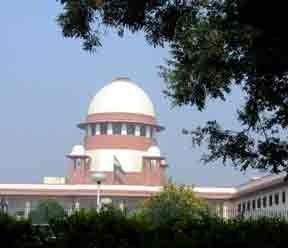 Big blow for Justice Dinakaran: SC lifts stay on impeachment proceedings
Big blow for Justice Dinakaran: SC lifts stay on impeachment proceedings
New Delhi: In a setback to Sikkim High Court Chief Justice P D Dinakaran, the Supreme Court on Tuesday refused to quash some of the charges framed against him by a Rajya Sabha-appointed panel looking into allegations of corrupt practices and misconduct against him.
A bench headed by Justice G S Singhvi, however, allowed Dinakaran's plea seeking removal of senior advocate P P Rao from the inquiry panel.
The bench asked Rajya Sabha chairman and Vice President Hamid Ansari to reconstitute the panel by replacing Rao with another distinguished jurist.
The court, however, made it clear that Dinakaran will be facing the same charges which were framed by the three-member committee comprising Supreme Court judge Justice Aftab Alam, Karnataka High Court Chief Justice J S Khehar and senior advocate P P Rao.
Rajya Sabha Chairman Hamid Ansari had in January 2010 constituted the three-member panel to examine the 12 charges framed in the notice of motion adopted by the House.
The apex court had on April 29 stayed the probe by the panel after Dinakaran expressed apprehension of a biased inquiry due to Rao's presence in the panel and that the committee had exceeded its jurisdiction.
Dinakaran had challenged the proceedings on the ground that the panel had framed additional charges and was also independently conducting investigations and collecting material against him which, according to the judge, was not permissible under law. He had also sought Roa's recusal.
The charges against the judge include land grabbing, accumulation of unaccounted assets, passing judicial order for extraneous considerations, following which his elevation to the Supreme Court was also stalled.
Justice Dinakaran had contended that the panel has expanded the ambit of the probe beyond what was initially adopted by the Rajya Sabha motion.
Dinakaran had also sought Rao's removal on the ground that he was biased against him.
Senior counsel and former Additional Solicitor General Amrendra Saran, appearing for Dinakaran, had pointed out that Rao was part of the resolution passed in November 2009 under the aegis of the Bar Association of India to ask erstwhile Chief Justice of India K G Balakrishnan against elevating Dinakaran, 61, to the apex court due to various charges of corruption and judicial misconduct against him.
Saran had also argued that Rao was part of the delegation which subsequently met the Chief Justice and made a representation opposing Dinakaran's elevation.
The apex court had also rejected Sharan's contention that the panel can neither conduct its own probe nor frame any additional charges as it is prohibited under Section 3 of the Judges Inquiry Act.
"How can you say that Supposing someone fabricates documents and submits it to the Speaker or Chairman as the case may be. The members on the basis of the fabricated documents adopt the notice of motion. Should the committee not scrutinise the material?" the bench had asked.
"They are legally trained minds who can detect the fabricated material. In fact, it would offer protection to a judge also from baseless allegations," the bench had said.
 Yemen Is Not A Good Place To Imprison Terrorist Suspects
Yemen Is Not A Good Place To Imprison Terrorist Suspects
Among the escapees Wednesday were members of an al-Qaeda cell that has killed
foreign tourists and tried to attack the U.S. Embassy in Yemen and other Western targets,
according to Yemeni officials. [Al Qaeda in the Arabian Peninsula] was behind the
attempted bombing of a Detroit-bound commercial flight on Christmas Day 2009 and the
mailing of bombs on cargo planes destined for the United States.
The prison break Wednesday, though far from the first in Yemen, came at a moment of political
crisis in the country and seemed likely to heighten fears among U.S. counterterrorism
officials that AQAP is gathering strength as the authority of the central government weakens.
Even in the best of times, Yemen was not a great place to imprison radical Islamists. The prisons there have always been leaky at best, and the central government's authority didn't extend very far past the capital. Now the country is even more wracked by chaos and intranational violence than usual, and AQAP has scored some successes—the latest being this prison break. The Obama administration has apparently decided, in the wake of the Christmas Day and cargo bomb attacks, that this is a threat worthy of a semi-secret drone war but not, well, an "actual" war.
In a "real" war, we'd go in and detain these guys ourselves, rather than relying on incompetent and potentially backstabbing proxies. That doesn't, thankfully, seem to be on the table right now. (I don't think America can afford another land war in Asia.) But the war on terror does produce some odd paradoxes. In today's world, it's easier, politically and legally, for America to vaporize a foreigner it suspects of terrorism than it is to keep that person in prison. That's pretty weird.
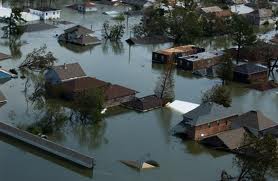 Joplin tornado disaster: 116 killed in Missouri, US
Joplin tornado disaster: 116 killed in Missouri, US
Chicago: A devastating tornado killed at least 116 people in US' Joplin city in the state of Missouri, and left over 2,000 homes in ruins, officials said. President Barack Obama has extended his condolences to the families of the city.
Officials at the Springfield-Greene county emergency management confirmed the toll Monday afternoon in Joplin, a city of 50,000 people, Xinhua reported.
The toll in the tornado that began on Sunday night stood at 89 on Monday morning.
Missouri officials said the toll was expected to climb as search and rescue continue.
Many people were injured and were admitted to hospitals.
The tornado touched down into the heart of the city at around 6 p.m. on Sunday, destroying hundreds of buildings.
Winds of up to 260 km per hour destroyed nearly 2,000 buildings, Jasper County emergency management officials said.
The tornado also cut a path nearly 10 km long and more than a kilometre wide near the city.
Besides, a series of gas leaks caused fires around the city overnight.
The city's residents were given about 20 minutes notice with tornado warning sirens before the tornado touched down on the west side.
But many people were unable to get to shelters in time, as "the storm was so loud you probably couldn't hear the sirens going off", said Missouri Governor Jay Nixon.
The governor has declared a state of emergency and called out the Missouri National Guard to help.
Authorities began a door-to-door search Monday. But the task was difficult as strong winds and heavy rain continued to torment the city.
Obama has called the governor to "extend his condolences" to the families of Joplin.
Last month, tornadoes killed over 300 people and caused more than $2 billion in damages to the US southern states. More than 200 people were killed in Alabama alone.
 Attack on NATO tankers bound for Afghanistan kills 16 people
Attack on NATO tankers bound for Afghanistan kills 16 people
At least 16 people were killed and several more injured when NATO oil tankers bound for Afghanistan were targeted with bombs in the Pakistani border town of Landi Kotal today, officials said. The oil tankers were parked at the Torkham border terminal when they were targeted with timed explosive devices. At least 10 tankers were destroyed by the blaze and another exploded while the fire was being doused, officials said. Eight of the dead belonged to the same family. Six persons were killed instantly while 10 more succumbed to their injuries in hospital. Tankers ferrying fuel for NATO forces in Afghanistan travel from the port city of Karachi to the northwestern border town of Landi Kotal through insurgency-hit areas where they are frequently attacked.
 Obama watched Osama bin Laden killed
Obama watched Osama bin Laden killed
Washington: While Pakistan was unaware of what was happening in its backyard, US President Barack Obama watched as an American commando shot the world's most wanted man Osama bin Laden.
Photographs released by the White House show President Obama watching on a TV screen as a commando gunned down Osama Bin Laden.
The visuals were being transmitted to the Situation Room in the White House via a video camera fixed to the helmet of a US Navy Seal.
Obama saw the Al Qaeda chief shot in the left eye. The Navy Seal then shot him again to ensure that he was dead.
The footage of the firefight in Osama bin Laden's hideout in Abottabad was relayed to the White House by satellite. The footage also shows the moment when one of the world's most feared men hid behind his wife and used her as a human shield.
 Royal couple ties the knot at a grand wedding show at London.
Royal couple ties the knot at a grand wedding show at London.
Newlyweds Prince William and Kate Middleton sealed their wedding with a pair of kisses on a balcony at Buckingham Palace, delighting thousands of spectators.
There was a roar of approval from the crowd as William and his bride exchanged a peck on the lips.
It was quickly followed by another, then a flyby of vintage and modern Royal Air Force planes.
The couple will now attend a lunch reception for 650 guests, followed by an evening party for 300 friends and family.
The couple were earlier pronounced man and wife, marrying in an elegant ceremony at Westminster Abbey.
The cool, overcast weather failed to put a dampener on the biggest royal event in three decades as hundreds of thousands turned London red, white and blue for the big day.
The couple will receive the titles of Duke and Duchess of Cambridge.
William also became the Earl of Strathearn and Baron Carrickfergus, which means Middleton will become the Countess of Strathearn and Baroness Carrickfergus.
Her transformation from a commoner to a future queen was complete on as she entranced a global audience of two billion people.
She emerged from a Rolls-Royce at Westminster Abbey in a long sleeved dress designed by Sarah Burton of Alexander McQueen.
With a full veil, deep v neckline, laced sleeves and teardrop diamond earrings, she cut a spellbinding figure, topped by a Cartier halo tiara lent to her by the Queen.
In his scarlet tunic and navy blue trousers of the Irish Guards, Prince William, 28, cut a dashing figure, his arrival at the church announced by the sounds of bells ringing out in central London.
He waved to the crowds before entering alongside Prince Harry, who himself made a regal appearance in his Blues and Royals uniform at the scene of their at their mother, Diana's funeral in 1997.
With a nail-biting final 50-minute wait for his bride on his hands, William shared some quiet time together with his younger brother and best man away from the cameras to pass away the time.
A million people packed the streets and an estimated 2 billion more tuned in around the world for the ceremony.
The couple looked nervous but happy and got through their vows without stumbling before Archbishop of Canterbury Rowan Williams pronounced them husband and wife.
They composed a prayer for their wedding, read by the Right Rev. Richard Charters, Lord Bishop of London:
"God our Father, we thank you for our families; for the love that we share and for the joy of our marriage.
"In the business of each day keep our eyes fixed on what is real and important in life and help us to be generous with our time and love and energy.
"Strengthened by our union, help us to serve and comfort those who suffer. We ask this in the spirit of Jesus Christ. Amen."
The guest list was a Who's Who list of royalty, power and fame: David and Victoria Beckham, Elton John, Prime Minister David Cameron, the queen of Greece, the cream of British nobility were among the hundreds of guests.
Australian Olympic swimming legend Ian Thorpe was among the first to arrive, showing up shortly after 9am local time.
Chelsy Davy, Prince Harry's on-again-off-again girlfriend, was wearing a blue satin gown. Tabloids have speculated endlessly about the state of her relationship with the younger royal - and her invitation to the abbey was seen as a sign the pair were still close.
Other guests: Actor Rowan Atkinson, a friend of Prince Charles best known for his Mr. Bean act, and Guy Ritchie, director of Lock, Stock and Two Smoking Barrels and ex-husband of Madonna.
Socialite Tara Palmer-Tomkinson arrived decked out in royal blue: dress, hat, and heels.
Diplomats and their partners from more than 180 countries trooped in about an hour and a half before the start of the ceremony. Australian Prime Minister Julia Gillard was among the foreign dignitaries filing into the abbey.
Cameron, Deputy Prime Minister Nick Clegg, Labour leader Ed Milliband, London Mayor Boris Johnson, British Foreign Secretary William Hague and former Prime Minister John Major were among the leading UKpoliticians picking their way through the crowd.
Royal guests included Queen Anna-Marie of Greece and Princess Mathilde of Belgium.
A number of famous people were left off the guest list, including President Barack Obama and most other world leaders. Also not invited were Britain's last two prime ministers, Tony Blair and Gordon Brown, in what is seen by some as a snub to their Labour Party, which traditionally is not as strong a backer of the monarchy as the ruling Conservatives.
 Taliban chief Baitullah Mehsud was killed in a US drone attack
Taliban chief Baitullah Mehsud was killed in a US drone attack
"Information is coming from that area that he is dead," Interior Minister Rehman Malik told reporters in
comments broadcast by private TV channel Geo.Tribesmen said on condition of anonymity that Mehsud was killed with his wife when a US drone fired two missiles into a family home in the Laddah area of South Waziristan on Wednesday.
Senior officials in Pakistan's powerful security establishment who supervise operations in Mehsud's
Waziristan stronghold said the warlord was dead, but the civilian government said it was still confirming
this.
 Global alert13 suspects wanted for the audacious 26/11
Mumbai terror attacks
Global alert13 suspects wanted for the audacious 26/11
Mumbai terror attacks
The alert was issued on written request by Islamabad, which said the 13 suspects were wanted by police
authorities in Pakistan in connection with ongoing investigation into the Mumbai terror attacks, a
statement released by the international police agency said.
Though the statement did not identify the suspects, but it said the global alert contains the names of
the fugitives and their other data which has been sent to 186 member countries.
Interpol issued a global alert for 13 suspects wanted for the audacious 26/11
Mumbai terror attacks that claimed nearly 183 lives.
The alert asks Interpol member countries to assist in locating the fugitives and immediately notify
National Central Bureau (NCB) at Islamabad or Interpol's General Secretariat headquarters in Lyon in
France with any investigative leads.
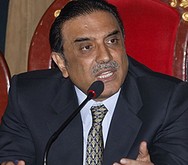 Osama dead or alive no evidence
Osama dead or alive no evidence
President Asif Ali Zardari said on Monday that Pakistani intelligence believes Al-Qaeda leader Osama bin Laden is dead but acknowledged they had no evidence
"The Americans tell me they don't know, and they are much more equipped than us to trace him. And our own intelligence services obviously think that he does not exist any more, that he is dead," he said.
Zardari said ,the question is whether he is alive or dead. There is no trace of him,but there is no evidence, you cannot take that as a fact, .We are between facts and fiction.
 We're fighting for the survival of Pakistan
We're fighting for the survival of Pakistan
Pakistan President Asif Ali Zardari into signing the Shariah into force in Swat,
a pro-Taliban cleric announced on Sunday that there is no room for democracy
under Islamic law.
He added that Pakistan's rulers were pleasing the West and demanded that all
judges be withdrawn from Malakhand area or they will have to face consequences.
In Swat's Mingora, Sufi Mohammad said: "Democracy is
the system of Kafirs (non-believers)." He said no one can appeal against the
Shariah courts
In reaction to Mohammad, Zardari said: "Taliban is trying to take over the state
of Pakistan. So, we're fighting for the survival of Pakistan."
Appealing for support from the UK and the US, he said: "You've got democracy,
democracy is part of the solution, but the second part of the solution is with
you, so please give us that help that we need."
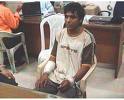 Pak demands Kasab’s statement
Pak demands Kasab’s statement
Pakistan had asked India to provide an “authentic copy” of Ajmal Kasab’s court statement to Pakistan to expedite investigations.
Prime Minister’s Advisor on Interior Rehman Malik said that . Talking to the media at Walima reception of PPP leader Jehangir Badr’s son, Zulfiqar Badr, on Sunday night, he said Pakistan needed Indian help to further investigate the incident of Mumbai attacks, but it had not yet answered all questions in this regard.
He asked India to provide an attested copy of Ajmal Kasab’s statement in court of law facilitate the investigation process. He said government had arrested six accused in connection with Mumbai incident but it was not possible to prosecute them in the absence of strong evidence.
He said Pakistan was investigating the matter with sincerity. Talking about the menace of terrorism, Malik said may it be in Pakistan or elsewhere in the world, it must be condemned.
 Pakistan should not 'hide' involvement in 26/11- Former Pak President Pakistan should not 'hide' involvement in 26/11- Former Pak President
The issue is that the nation and the people should oppose terrorism. If any of our people are involved in whatever
happened in Mumbai and it comes out in the open, we should not hide it," Musharraf told media-persons in Islamabad.
Pakistan should not make efforts to "hide" the involvement of its nationals in the Mumbai terror attacks , former
President Pervez Musharraf has said, insisting that "we can't deceive the world".
"We can't deceive the world. We should openly oppose terrorism and extremism," Musharraf said while replying to a
question on whether the Pakistan government was acting under pressure from the world community after the Mumbai
incident."Pakistan is not a weak country, it is a nuclear and missile power. No one should have the mistaken impression that Pakistan is weak," he said.Islamabad last week said it had taken into custody six Pakistani nationals for their involvement in the Mumbai attacks and acknowledged that part of the conspiracy behind the incident was hatched on Pakistani soil.
In a lighter vein, Musharraf indicated that he would continue to be a "tough guy" in dealing with India when he
visited the neighbouring country next month to participate in the India Today conclave.Asked if he would continue his
"tough guy" approach towards India, Musharraf laughed and replied, "I never believe in weakness I always speak
frankly." Musharraf said he would be the keynote speaker at the India Today conclave, which he described as "a very
prestigious get-together" of intellectuals. "The conclave has been attended by former South African President Nelson Mandela, former US President Bill Clinton and other world leaders in the past. It is a matter of pride that I have been invited," he said, adding he would deliver a "frank talk" at the meet.
Asked if he planned to return to politics, Musharraf replied: "I am not doing that." Musharraf resigned as President
in August last year to avoid impeachment by the Pakistan People's Party-led government. He has maintained a low
profile since then.
 Kazutsugi Nami Chairman arrested in Japan 'scam'. Kazutsugi Nami Chairman arrested in Japan 'scam'.
Kazutsugi Nami, chairman of the now bankrupt L&G, had offered investors 36% annual returns and issued special electronic money termed "Enten". Japanese police have arrested the chairman of a Tokyobedding supplier over an alleged investment scam reportedly worth $1.4bn (£970m).
"Enten" was fed into investors' mobile telephones and used to buy items ranging from vegetables to futons, clothes and
jewellery.Enten" is apparently a combination of the Japanese words for the yen currency and paradise. L&G was established in 1987, at first selling bedding and health products.It began its investment scheme, including the issuance of "Enten", in 2001.
The company stopped paying cash dividends in February 2007, and by September of that year had sacked most of its
employees.kyodo reported, It folded in November 2007 and is now undergoing a court-led bankruptcy process.
Two protesters have attacked the New Zealand Prime Minister.
Two protesters have attacked the New Zealand Prime Minister, John Key, as he arrived at a Maori memorial at Waitangi for celebrations marking National Day.One of the pair, whom Mr Key described as "glory seekers", managed to grab the prime minister before both were arrested and taken away by police. Mr Key, who is already recovering from a broken arm, said he was "quite shocked" by the incident.But he said the attack would not hinder government dialogue with the Maori.
National Day celebrations have often been marred by Maori activists who argue that the New Zealand government has
failed to honour the treaty - signed at Waitangi - founding the former British colony in 1840. Protesters say the agreement giving the indigenous people equal rights and ownership of tribal lands has not been upheld.
Maori activists
"It all happened very fast and I was quite shocked by it actually. "The next thing you know the diplomatic protection people around me were hauling this guy off and another guy came at me," Mr Key told Radio New Zealand.
The Maori Affairs Minister, Pita Sharples, was knocked over as police tussled with the protesters, he said.The two men
aged 19 and 33 were later charged with assault.Mr Key's predecessor, Helen Clark, refused to attend the annual
celebrations there after she was jostled in 2004.
Abducted Engineers Releases
Unharmed
 The two
Indian Engineers taken captive about 3 weeks ago by some unidentified
people in Afghanistan have been set free unharmed. Government sources
have denied the involvement of the Taliban in this act. Both the engineers
were taken hostage while they were working on Kabul-Kandhar highway Project
in the southern province of Zabul. The two
Indian Engineers taken captive about 3 weeks ago by some unidentified
people in Afghanistan have been set free unharmed. Government sources
have denied the involvement of the Taliban in this act. Both the engineers
were taken hostage while they were working on Kabul-Kandhar highway Project
in the southern province of Zabul.
 India-Myanmar-Thailand
Highway to be constructed India-Myanmar-Thailand
Highway to be constructed
A Highway connecting India, Myanmar & Thailand with one together was
decided to be constructed in a Meeting of the Foreign ministers of the
three countries. This 1360 km long Highway would cost about $70 &
the Project will be completed in three phases.
Five new members in the
security council
Algeria, Benin, Brazil. Philippines
& Romania have got a 2-years admission in the 15-members United Nations
Security Council. The nations have entered the council after the completion
of the 2-years term of Bulgaria, Cameroon, Ginny, and Mexico & Syria.
The council includes five permanent & 10 temporary member nations
of which five finish their tenure every year.
At present the permanent members are America, Britain, Russia, France
& China.
Ireland becomes EU president
Ireland has taken over the charge as the president of the European
Union. Each member country of the Union has a 6-months tenure for presiding
over the union.
|



